חי:ג


Rabbi Avi Berman
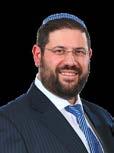
Executive Director,
Rebbetzin Shira Smiles
ISSUE 1504 FEB 11TH '23 ג"פשת טבש 'כ PARSHAT YITRO ה"ב OU ISRAEL 02-560-9100 | TorahTidbits.com | ADVERTISING 02- 560-9125 ורתי תשרפ YERUSHALAYIM IN/OUT TIMES FOR SHABBAT PARSHAT YITRO CANDLES 4:45PM • HAVDALA 6:00PM • RABBEINU TAM 6:33PM
Dear Torah Tidbits Family
OU Israel page 4
Bountiful Brachot
Faculty, OU Israel Center page 34 ילשמ הב םיקיזחמל איה םייח ץע
04Dear Torah Tidbits Family
Rabbi Avi Berman
08Taking Notice
Rabbi Moshe Hauer
10Aliya By Aliya Sedra Summary
Rabbi Reuven Tradburks
16
Fathers-in-Law
Rabbi Dr. Tzvi Hersh Weinreb
52Wings of Eagles
Rabbi Moshe Taragin
56Haftorah Insights
Rebbetzin Dr. Adina Shmidman
22To Thank Before We Think
Rabbi Lord Jonathan Sacks zt"l
28Probing The Prophets
Rabbi Nachman Winkler
30Why Didn’t Moshe Establish a Hierarchical System Before Being Advised By Yitro? Rabbi Shalom Rosner
34Bountiful Brachot
Rebbetzin Shira Smiles
36Where God is Found
Rabbi Judah Mischel
40OU Israel Schedule
50
Simchat Shmuel
Rabbi Sam Shor
58The Neshama of the Nation
Rabbi Aaron Goldscheider
62Putting on Tallit and Tefillin in Early Morning Rabbi Daniel Mann
64Post Tu Bishevat 5783: What Is The Significance Of This Date For Ma’aserot This Year? Rabbi Moshe Bloom

66Freedom Sivan Rahav Meir
68Practical Conclusions
Rabbi Gideon Weitzman
70The Y- Files Weekly Comic Netanel Epstein
72From The Ha’amek Davar Dr. Jacob Solomon
76OU-JLIC Ari Levisohn
78Torah 4 Teens By Teens
Shimmy Goldsmith // Aharon Rosensweig
2 TORAH TIDBITS 1504 / YITRO 5783
Torah Tidbits cover image!
Table of Contents This week's
Photo By: Zev Rothkoff
I
live in Efrat. My parents brought me on aliyah 50 years ago. The blooming almond trees remind us that spring is not far off. This picture was taken in the beautiful Galil.
CANDLE LIGHTING
AND HAVDALA TIMES
OTHER Z'MANIM
JERUSALEM
Ranges 11 days Wed - Shabbat
Feb. 8-18 / 17-27 Shevat
Earliest Tallit and Tefillin 5:35 - 5:27
Sunrise 6:27 - 6:18
Sof Zman Kriat Shema 9:10 - 9:06
Magen Avraham 8:33 - 8:29
Sof Zman Tefila 10:04 - 10:01
(According to the Gra and Baal HaTanya)
Chatzot (Halachic Noon) 11:53
Mincha Gedola (Earliest Mincha) 12:23
Plag Mincha 4:11 - 4:17
Sunset (Including Elevation) 5:24 - 5:32
Seymour J. Abrams • Orthodox Union Jerusalem World Center • Avrom Silver Jerusalem College for Adults • Wolinetz Family Shul • Makom BaLev • Birthright • Yachad • NCSY in Israel • JLIC in Israel • Pearl & Harold M. Jacobs ZULA Outreach Center • The Jack Gindi Oraita Program • OU Israel Kashrut
STUART HERSHKOWITZ, PRESIDENT OU ISRAEL
Zvi Sand / Yitzchak Fund: Former Presidents, OU Israel

| Rabbi Emanuel Quint z”l, Senior Vice President | Prof. Meni Koslowsky, Vice President
VAAD MEMBERS:
Dr. Michael Elman | Moshe Kempinski | Sandy Kestenbaum | Norman Shmutter | Esther Williams | Harvey Wolinetz

RABBI AVI BERMAN, EXECUTIVE DIRECTOR, OU ISRAEL
TImes According to MyZmanim (20 min. before sundown in most cities, 40 min. in Yerushalyim and Petach Tikva, 30 min. in Tzfat/Haifa)
OU Kashrut NCSY Jewish Action JLIC NJCD / Yachad / Our Way OU West Coast OU Press Synagogue/Community Services OU Advocacy OU Israel
MITCHEL R. AEDER, PRESIDENT OF THE ORTHODOX UNION Yehuda Neuberger, Chairman of the Board, Orthodox Union | Dr. Josh Penn, OU Kashrus Commission

RABBI MOSHE HAUER, EXECUTIVE VICE PRESIDENT | RABBI JOSHUA M. JOSEPH, ED.D. EXECUTIVE VICE PRESIDENT & CHIEF OPERATING OFFICER
Rabbi Dr. Tzvi Hersh Weinreb, Exec. V.P. Emeritus
OU KOSHER: Rabbi Menachem Genack, CEO/Rabbinic Administrator OU Kosher | Rabbi Moshe Elefant, COO/Executive Rabbinic Coordinator ISRAEL: Rabbi Yissachar Dov Krakowski, Rabbinic Administrator | Rabbi Ezra Friedman, The Gustave & Carol Jacobs Center for Kashrut Education/Rabbinic Field Representative
Headquarters: 40 Rector St. 4th floor, New York, NY 10006 212-563-4000 website: www.ou.org
Editor Emeritus: Phil Chernofsky
Editor: Rabbi Aaron Goldscheider | aarong@ouisrael.org
Advertising: Ita Rochel | 02-5609125 or ttads@ouisrael.org
Website: www.torahtidbits.com
Not getting enough TTs? Too many? None at all?
Contact our DISTRIBUTION 050-577-2111 • ttdist@ouisrael.org
David Katz, CFO, OU Israel | Chaim Pelzner, Director of Programs, OU Israel | Rabbi Sam Shor, Director of Programs, OU Israel Center Rabbi Sholom Gold, Dean, Avrom Silver Jerusalem College for Adults
22 Keren HaYesod <> POB 37015 <> Jerusalem 91370
phone: (02) 560 9100 | fax: (02) 561-7432
email: office@ouisrael.org
website: www.ouisrael.org
Founders and initial benefactors of the OU Israel Center: George and Ilse Falk a"h
Torah Tidbits and many of the projects of OU Israel are assisted by grants from THE JERUSALEM MUNICIPALITY
OU Israel, Torah Tidbits does not endorse the political or halachic positions of its editor, columnists or advertisers, nor guarantee the quality of advertised services or products. Nor do we endorse the kashrut of hotels, restaurants, caterers or food products that are advertised in TT (except, of course, those under OU-Israel hashgacha). Any "promises" made in ads are the sole responsibility of the advertisers and not that of OU Israel, the OU Israel Center , Torah Tidbits.
OU ISRAEL CENTER 3
MISHPATIM HAVDALA YITRO CANDLES Havdala Candles 6:00 Yerushalayim / Maale Adumim 4:45 6:05 4:51 6:08 5:09 6:02 Aza area (Netivot, S’derot, Et al) 5:03 6:06 5:10 6:01 Beit Shemesh / RBS 5:04 6:06 5:07 6:00 Gush Etzion 5:01 6:06 5:07 6:01 Raanana/ Tel Mond/ Herzliya/ K. Saba 5:01 6:06 5:07 6:00 Modi’in / Chashmona’im 5:01 6:06 5:07 6:01 Netanya 5:01 6:07 5:09 6:02 Be’er Sheva 5:03 6:07 5:08 6:01 Rehovot 5:02 6:06 4:51 6:01 Petach Tikva 4:45 6:05 5:07 6:00 Ginot Shomron 5:01 6:05 4:56 6:00 Haifa / Zichron 4:50 6:05 5:06 5:59 Gush Shiloh 5:00 6:07 5:08 6:01 Tel Aviv / Giv’at Shmuel 5:02 6:05 5:11 6:00 Giv’at Ze’ev 5:05 6:06 5:07 6:00 Chevron / Kiryat Arba 5:01 6:08 5:09 6:02 Ashkelon 5:03 6:07 5:08 6:01 Yad Binyamin 5:02 6:03 4:59 5:57 Tzfat / Bik’at HaYarden 4:53 6:03 5:04 5:57 Golan 4:58 Rabbeinu Tam (J'lem) - 6:39PM • next week - 6:45pm
DEAR TORAH TIDBITS FAMILY
RABBI AVI BERMAN Executive Director, OU Israel
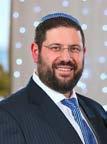
The timing of Tu B’Shvat begs the question: if we are celebrating the growth of fruit, why are we doing so in the cold and rainy winter when no fruit can be found? The answer is that during the winter season, the development of fruit begins. Although we cannot see the growth taking place before our eyes, we celebrate what we know spring will bring.
This past week I had the honor and privilege of celebrating OU Israel’s 1st Annual Erev Tu B’Shvat Luncheon at the OU-certified Psagot Winery, commemorating the 22nd anniversary of The Pearl & Harold Jacobs Zula Outreach Center. The crowd of over 200 people was joined by a number of special guests - Mitch Aeder, President of the Orthodox Union and Rabbi Dr. Josh Joseph, OU’s Executive Vice President and Chief Operating Officer - both of whom flew in for the event. Rabbi Dr. Sholom Gold, Dean of OU Israel’s Avrom Silver Jerusalem College for Adults and former Rabbi of Zichron Yosef in Har Nof, joined

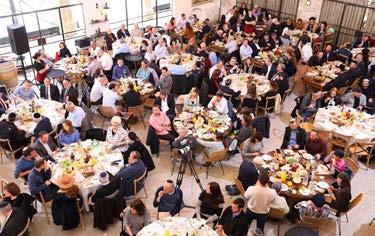
us as well.
When planning this fundraising event we could not have picked a better date on the calendar. The celebration of Tu B’Shvat is a deep lesson in chinuch and highlights the dedicated work of the Zula staff, composed of trained therapists, counselors and mentors united in their mission to actualize the potential they see in each and every teen. The theme of this year’s event complimented both the day and the mission of The Zula, “Helping the Next Generation Blossom.”
Before our featured speaker addressed the crowd, we shared a video of The Zula to help donors and attendees appreciate the efforts and achievements of the program. Seeing the emotion on the faces of our guests, I could not be prouder of our team. Following the video, guests listened to a young mother, Mevaseret, who was an alum of The Zula. Mevaseret drove from Be’er Sheva with her husband and eightmonth-old daughter to stand before us and thank each and every staff member of The Zula for the impact they had on her life.
4 TORAH TIDBITS 1504 / YITRO 5783
She spoke for just a few minutes yet left the crowd in tears.
Mevaseret began attending The Zula when she was 14-years-old and quickly found a home that she frequented up until just a few years ago. She bravely shared the traumas she endured and explained how the endless belief, support and unconditional love that she found at The Zula changed her life’s trajectory.
After her speech I was overcome with emotion as I went over to Mevaseret to thank her. I said simply, “Mevaseret, I know that took a lot of guts. Thank you.” She replied, “I have always been taught about the importance of hakarat hatov. We drove nearly three hours this morning so that I could share my gratitude. How could I not say thank you on behalf of myself and my family?”
As Torah Tidbits readers will remember, the event’s guest of honor was Zvi Sand, who











OU ISRAEL CENTER 5 True wholesaler from the
with over 25 years experience member diamond dealers club Engagement Rings ∙ Stud Earrings Pendants ∙ Tennis Bracelets 050-573-9061 jeffmor36@gmail.com www.JeffMorDiamondJewelry.com
diamond boursa
Dedicated L’iluy Nishmat ל"ז ןתנ 'ר ןב ריאמ דוד 'ר Meyer Rich z”l whose 12th Yahrtzeit is on טבש ד"כ
Mevaseret with her husband and daughter, addressing the crowd
recently concluded his term as OU Israel President. Together with his friends and family, this event also served as his seudat hoda’ah, celebrating Zvi’s miraculous recovery from a critical health scare earlier this year. Showing our gratitude and support for his tireless contributions to OU Israel over the last six years, we played a video in which Zvi’s colleagues, friends and family shared the impact he has had on them.
It was particularly meaningful to have Rabbi Dr. Sholom Gold in attendance –especially for Zvi. Rabbi Gold is a trailblazer - not only in the community he led in Har Nof where my grandparents lived, but also in OU Israel. More than 20 years ago Rabbi Gold opened the Avrom Silver Jerusalem College for Adults in the OU Israel Center. From his program stemmed a variety of initiatives that we now offer at the OU Israel Center. As someone who brings the vibrancy and joy of Torah to all those he encounters, Rabbi Gold always attracts crowds whenever he returns to OU Israel to give one of his fiery shiurim or when he joins the Torah Yerushalayim program. During the fundraising event, Rabbi
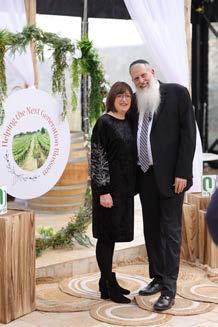
Gold in his usual way connected with attendees and brought tremendous simcha to those around him. After the event I spoke with Rabbi Gold to thank him for coming. He said, “Avi, thank you for giving me the opportunity to reconnect with Am Yisrael and enjoy the company of those who came to support teens in need. I was deeply moved by the video that I saw and by the work that you are doing.” As someone who has tremendous respect and hakarat hatov to Rabbi Gold, I couldn’t help but end the day on a high.

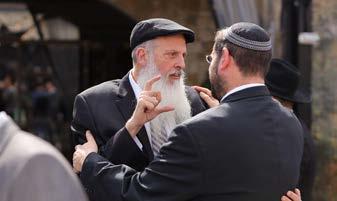
The event proved meaningful for attendees and I cannot wait for next year’s Tu B’Shvat celebration. I hope that you join us and experience the magic of The Zula for yourselves. As I reflect on what transpired during the luncheon and the apparent impact that Mevaseret and the other speakers had on guests, The Zula would not be the success that it is without the support of OU Kosher and the devoted OU Israel donors.
One donor approached me and said, “Avi, I knew about the other OU Israel programs, but how have I never heard of The Zula? It’s outstanding!”
6 TORAH TIDBITS 1504 / YITRO 5783
Zvi Sand, the Guest of Honor
My father and I with Rabbi Sholom Gold
Zvi Sand, the Guest of Honor, and his wife Tamara
but you could possibly do them. For when it comes to communications from G-d, you are unique, irreplaceable, sui generis, one of a kind.

Heartfelt Mazel Tov wishes to our dear cousins Zvi & Tamara Sand and to Manual & Esterella Sand on the honoring of Zvi for all his dedication, hard work and generosity to OU Israel and the Jewish Community.
Love from Estie & Steve Solomon
This exchange presents a fundamental principle of the Torah: that G-d speaks to Moshe in a way that He does not, nor will He in the future ever do again with anyone else. When Moshe says that people come to him seeking G-d, what he means is: I have access to G-d. He speaks to me. (Speaking to G-d isn’t the trick; the trick is when He answers back.) Similarly, when Moshe says that he teaches G-d’s law, what he means is that G-d communicates those laws to him and to no one else.
This could very well be the prime purpose of this Yitro story. For, in the very next story, the giving of the Torah, the very same theme of Moshe’s uniqueness as the one to whom G-d speaks is central.
I thank each and every donor who has had a direct hand in partnering with OU Israel to provide the warm, loving and stable environment that many Israeli teens so desperately need. I wish a hearty Kol HaKavod to The Zula staff for their commitment to each and every teen that walks through the door. I offer my deepest thanks to Zvi Sand for elevating OU Israel over the last six years and am thrilled to welcome OU Israel’s President, Mr. Stuart Hershkowitz. May we continue to be successful in our efforts.
kerenmalki.org

02-567-0602
Keren Malki empowers families of children with special needs in Israel to choose home care. Donations are tax-approved in Israel, US and UK.
Honoring the memory of Malka Chana Roth ד”יה 1985-2001, killed in the Sbarro bombing.
Wishing you all an uplifting and inspiring Shabbat,
3rd aliya (18:24-27) Moshe heard. He chose judges, with only the most difficult cases brought to him. Moshe sent Yitro home.
 Rabbi Avi Berman Executive Director,
Rabbi Avi Berman Executive Director,
OU Israel


 aberman@ouisrael.org
aberman@ouisrael.org
It takes an honest leader to accept suggestions to improve. Moshe displays his honesty and humility – if the suggestion is good, embrace it. Just as Yitro accepted the news of the Exodus and affirmed One G-d,


OU ISRAEL CENTER 7
MarSea Modest Swim & Casualwear www.MarSeaModest.net (NIS) www.MarSeaModest.com ($USD) Marci Rapp 050-424-8359 THE BEST DESIGN, ENGINEERING AND INSTALLATION OF AIR davidz@AshkelonProperties.com LIVE OPPOSITE THE SEA 0544-332621 Owning your own apartment does not just allow you freedom, but offers monetary savings, and an increase in your investment value. Anglo-populated, sunny Ashkelon is the answer! It’s very affordable – from $500,000 with just a 15% down payment, mortgages available as well as bank guarantees. Rental income often in excess of 3.5%. LIVE OPPOSITE THE SEA davidz@AshkelonProperties.com call David at 054-433-2621 www.ashkelonproperties.com F a b u l o u s 4 , 5 & 6 r o o m a p a r t m e n t s . . . A n g l o p o p u l a t e d c l o s e t o s h u l s & b e s t b e a c h e s . . . Ashkelon: Not Just a Sea-View Apartment, but a Community! Choice apartments still available
OU Executive Vice President
Taking Notice
How do we relate to what happens around us? Do we notice the subtle or even the obvious? Do we allow our observations to make us wiser and more thoughtful, or do we ignore inconvenient truths?
Last week’s parsha ended with Amalek waging war against the Jewish people. While other nations had reacted humbly and wisely to the miracles that Hashem performed for the Jewish People in Egypt, Amalek did not. Instead of accepting the clear divine message in the miraculous exodus, they chose to push back against it and attack. By contrast, this week’s parsha begins with Yisro, who hears the same miraculous stories and is drawn to join the Jewish people, understanding the divine destiny that those miracles implied (see Shemos Rabba 27:6).

Two very different reactions to the same story. Both noticed; one was guided by the message, and one chose to ignore it. This same contrast appears in the Jewish experience in Egypt. Our sages taught us to see patterns in the stories of the Torah,

ma’aseh avos siman l’banim. Thus, we see the story of Avraham’s early descent to Egypt due to famine as a forerunner of the future Egyptian exile (Bereishis Rabba 40:6). Yet there is a great gap between the stories. The Pharaoh of Avraham’s time was struck by a plague after taking Sarah. Not a word was shared with him as to why it happened; he did not even realize that Sarah was a married woman. Yet, when he experienced the plague, he immediately considered its message, realized where he went wrong, and let Sarah go back to Avraham (see Ramban to Bereishis 12:18). The Pharaoh of Moshe’s time reacted quite differently. Plague upon plague was visited upon him and his nation accompanied by a clear narrative as to why. But he did not learn or adjust. His hardened heart knew what was happening but pushed back against it. Why the striking contrast?
In each case, Pharaoh responded in the manner of his Jewish guests. Avraham was awake to the world around him. He learned and observed, discovering Hashem’s existence where his family and society had obscured His presence. When Avraham brought G-d to Pharaoh, he noticed.
The Jews of Pharaoh’s time had become hardened and deadened by their bondage. They were not searching for and seeing G-d’s messages in their lives. In fact, even when presented with redemption they struggled to hear its call “due to their shrunken spirit and due to the difficult work.” (Shemos 6:9).
8 TORAH TIDBITS 1504 / YITRO 5783 FROM THE DESK OF
RABBI MOSHE HAUER
In loving memory of Rabbi Dr. O. Asher Reichel ל"צז on his 11th yahrzeit, טבש ט"י
From the Bronner and Reichel Families
Moshe was therefore hopeless about the prospects of Pharaoh’s listening and learning; “the Jewish People did not listen to me, and how will Pharaoh listen?” (6:12). Even when Pharaoh would have no choice but to notice, he would choose not to learn from what he saw.
How did we break free from this willful ignorance? It would come about through the leadership of Moshe. Moshe emerged as the redeemer through his curiosity and concern, his observance of the world around him and his vigilance in reacting to it and learning from it. Whether in leaving the comfort of the palace to take in the suffering of his brethren (2:11), or his turning from the main road to notice the phenomenon of the burning bush (3:3-4), it was this quality of Moshe – this commitment to take notice of reality and to be guided by it - that would ultimately lead to the unlocking of the Jewish People’s hearts and subsequently, Pharaoh’s.
There is so much happening in the world around us. We can ignore it and allow it to go unnoticed, and when it stares us in the face, we may nevertheless choose to push back against what we see and leave its lessons unlearned. Alternatively, we can follow the paths of Avraham and Moshe, stopping to look, to notice, to learn, to think, and to change course based on our observations.
That is the path to freedom, and it is a path we must take.
PROJECTS, BUILDINGS AND VILLAS

Presales and immediate occupancy.
SHAAREI CHESSED / RECHAVIA
1) Renovated 110 sqm 3 bdrms, 1st floor, succah.
2) Beautiful 3 bdrm apt + 50 sqm succah balcony, shabbat elevator, parking and view.
3) New 228 sqm duplex penthouse, 30 sqm succah balcony, shabbat elevator, parking and a view.
GERMAN COLONY
2 bdrms, 2 bathrooms, succah+ roof terrace.
OLD KATAMON
125 sqm, priv. entrance 3 exp. NIS 4,300,000
TALPIOT
Lovely 3 bdrms, 2 bathrooms, balcony, view, elevator, storage room, parking.
HAR NOF
* 5 rooms, renovated, large succah, view!
* Shlav B– 200 sqm garden duplex apartment.
BAKA– Spacious 2 bdrms, 2nd floor, furnished, succah balcony, private parking, immediate. NIS 6500
FOR MANY MORE PROPERTIES: 02-651-4030

OU ISRAEL CENTER 9
Eiferman Properties www.eifermanrealty.comLtd.
SALES
SALE
NEW LISTINGS
JERUSALEM
FOR
-
FOR RENT
In memory of Lillian Klaff a"h ה"ע בייל ריאמ תב האל on her 15th yahrzeit - טבש ז"י
Dan
clan
Herby & Debbie Klaff
and
KI TEITZEII
YITRO
ALIYA-BY-ALIYA SEDRA SUMMARY
Rabbi Reuven Tradburks Director of RCA Israel Region

Yitro joins Moshe. He advises Moshe in delegating to judges. At Mt. Sinai, G-d offers the Jewish people to be a treasured people. The Ten Commandments are given at Sinai. The people quake in response.
1st aliya (18:1-12) Yitro, Moshe’s father-in-law, moved by the exodus from Egypt, travels to
In loving memory of our husband, father and zeida
Prof. Yechiel (Cyril)
Domb z"l
meet Moshe, bringing Tzippora and the 2 sons. Moshe greets them and tells of all that has happened. Yitro blesses G-d, affirming that now he knows G-d is great, and offers offerings to Him.
Rashi claims that this story of Yitro occurs after the giving of the Torah – meaning, the Torah plucked it from its proper chronology and stuck it here. Presumably for a good reason. Why place this story here?
You could answer either by looking at what comes next or from what just happened. The story at the end of last week’s Parsha was the war with Amalek. This story of Yitro is placed here, juxtaposed to Amalek as a counterbalance. There are different types of non-Jews that we will encounter in history; there are Amaleks and there are Yitros. Amalek seeks our harm. Yitro seeks our G-d. Amalek sees our weakness. Yitro sees our greatness. Amalek fights us. Yitro partners with us.
טבש ב"כ
ךורב ורכז יהי
Mrs.
2nd aliya (18:13-23) Yitro observes the people standing and waiting all day for Moshe to adjudicate. Yitro questions this. Moshe responds: the people come seeking G-d; seeking adjudication; and I teach them G-d’s laws. Yitro criticizes Moshe. And suggests: You inquire of G-d on their behalf. And teach them G-d’s laws. But in addition, choose Judges who can adjudicate in your stead. Judges who are substantive, G-d fearing, men of truth and abhorring inappropriate gain.
Yitro offers good advice to Moshe; delegate authority to judges. But while he proposes delegating authority in the court system, he does not suggest delegating authority in Moshe’s other roles. Because
10 TORAH TIDBITS 1504 / YITRO 5783
ל"ז לאוי ןב לאיחי on his 11th yahrzeit
With loving memories of his wisdom, his loving kindness and his yiddishkeit
Shirley Domb and family
and our next step will be to plant a fruit tree. I never thought of myself as being the agricultural type, but the feeling of settling and planting a portion of Eretz Yisrael, has been truly euphoric. Iy”H, when we plant our tree, and eat the fruits that will grow one day, I think we will be able to truly appreciate that unique Kedusha found in the fruit of Eretz Yisrael!
in those Moshe is simply irreplaceable. Moshe told Yitro that he has 3 functions: aiding those seeking G-d, adjudicating disputes, and teaching G-d’s commands. Yitro tells him: others can settle disputes. But as for the inquiry of G-d and teaching G-d’s commands, well for those, no one but you could possibly do them. For when it comes to communications from G-d, you are unique, irreplaceable, sui generis, one of a kind.
To conclude, when you buy your Tu B'shvat fruit this year, don’t search for those dried apricots and banana chips imported from Turkey. Rather, head over to the fresh produce and buy yourself some nice juicy Kedusha-filled Jaffa oranges and thank Hashem for bringing you to this land in order to be able to הבוטמ עבשלו הירפמ לוכאל, imbibing that Kedusha in every bite that you take!!
This exchange presents a fundamental principle of the Torah: that G-d speaks to Moshe in a way that He does not, nor will He in the future ever do again with anyone else. When Moshe says that people come to him seeking G-d, what he means is: I have access to G-d. He speaks to me. (Speaking to G-d isn’t the trick; the trick is when He answers back.) Similarly, when Moshe says
In
loving memory of and תמשנ יוליעל
Our mother, grandmother, and great grandmother
JENNY WEIL a"h
ה"ע הרשו יכדרמ תב לטיג היח

On her 4th Yahrzeit
שדוק תבש - טבש 'כ
Very much missed by family and friends
Weil and Amsel families
In the heart of calm and pastoral BAKAArab house 6 rooms, 500m + possibility of building 250m, huge garden, approx. 700m, completely renovated, underfloor heating + air conditioning, large parking, 5 bathrooms, 5 toilets, green
MENDEL 052-8980111
VERY GOOD INVEST! In Bustan BakaIn a beautiful boutique building – Large 2 room apartment, ground floor (0 steps), elevator, balcony, parking
2450000NIS MENDEL 052-8980111
BAKA - quiet and pleasant little street5 rooms, 175m, on one level, alone upstairs, private entrance, elevator in the apartment, high ceilings
MIKAEL 052-3202488

In the heart of BAKA - on a calm and pastoral street - Spacious 5 rooms, elevator, terrace, store-room, parking, near all amenities,
5300000NIS MICHAEL 052-3202488

OU ISRAEL CENTER 11 OU ISRAEL CENTER 75
that he teaches G-d’s law, what he means is that G-d communicates those laws to him and to no one else.
This could very well be the prime purpose of this Yitro story. For, in the very next story, the giving of the Torah, the very same theme of Moshe’s uniqueness as the one to whom G-d speaks is central.
3rd aliya (18:24-27) Moshe heard. He chose judges, with only the most difficult cases brought to him. Moshe sent Yitro home.
It takes an honest leader to accept suggestions to improve. Moshe displays his honesty and humility – if the suggestion is good, embrace it. Just as Yitro accepted the news of the Exodus and affirmed One G-d, so too, Moshe admits he could improve his system. Two men of honesty and humility.
4th aliya (19:1-6) The people camped in the Sinai desert opposite the mountain. Moshe ascended the mountain. G-d told him: tell the people. If you will listen to Me, keep My covenant, then you will be a kingdom of cohanim and a holy nation. Tell that to the Jewish people.
This short aliya screams of significance: it is the invitation to an intimate encounter. The entire Torah to this point has been G-d’s reach for man. And here is the culmination of that reach. Akin to a Divine hug. G-d created the world, an act of desire for a world. He created man. He reached out to Avraham, promising, unsolicited, the land of Israel. But He kept His distance. Until Egypt, when He reached again to pull the Jewish people out of slavery, calling them His first born. Now He tells Moshe that He is pulling the Jewish people close as
His closest, cohanim, those who are in His inner sanctum.
5th aliya (19:7-19) Moshe presents G-d’s words to the people. They respond: all that G-d says we will do. G-d says: I will come to you in a cloud, so the people shall hear that I speak with you. Prepare them for 3 days for on the 3rd day I will descend in the view of all the people. No one shall touch the mountain. Moshe prepared the people. On the third day there was lightning and thunder, a thick cloud and a powerful shofar sound. The people in the camp were afraid. Moshe brought them out to the mountain. It was all in smoke for G-d descended in fire. The mountain shook. The shofar increased in power. Moshe spoke; G-d’s voice emanated.
The revelation of Sinai is a culmination of G-d’s reach for man. He promises, He redeems us, and now He speaks, communicates.
And although this moment is a pinnacle moment in the history of man, what the people actually heard is not at all clear. The narrative, without the midrashim, seems to relate that the people will overhear G-d speaking to Moshe. After all, Divine communication to man is overwhelming, inconsistent with our finite being. The people are afraid – Moshe needs to coax them out. Afterwards, in aliya 7, the people tell Moshe that they can’t take hearing G-d’s voice or they will die.
It is here that we really see Moshe’s uniqueness: as the only one to be able to hear G-d’s word and survive. The Torah will describe him as such later – no one else could tolerate “panim el panim”, direct communication from G-d. Moshe’s
12 TORAH TIDBITS 1504 / YITRO 5783
been memorialized in a popular song, "An eternal people does not fear the long and arduous path."
be in loving memory and נ"על our dear parents whose yahrtzeits are in Kislev
Doris Weinberger a"h
ולסכ 'ד -ה"ע המלש לאקזחי תב האל הרובד
Max Weinberger z”l
uniqueness is not as a leader, a legislator, a King, a warrior, a motivational speaker. His uniqueness is as the one who hears G-d’s words, His commands, His mitzvot, and is able to withstand that and survive.
ולסכ ז"כ -ל"ז בד ןב ךלמילא
Greatly missed by their children, grandchildren and great grandchildren
Rav Aryeh and Dvora Weinberger
Bernie and Leah Weinberger
Patience is necessary for those who follow Isaac's way. But a wise woman taught us that patience is but another name for hope. That woman was Jane Austen, who put these words into the mouth of one of the characters in her great novel, Sense and Sensibility: "Know your own happiness. You want nothing but patience—or give it a more fascinating name: call it hope."
Menachem and Hannah Katten
In observance of the Shloshim of our friend
The purpose of the revelation at Sinai is to expose the people to the experience, up close, of the communication from G-d to Moshe. This experience will reinforce for them that G-d speaks to Moshe so that they accept Moshe’s teachings later as being from G-d. And it will overwhelm them and bring them to believe in G-d.

Yehuda Leib Berren z"l
Rav Menachem Weinberg will give a shiur in his memory "Heroic Joy"
Monday evening, 23 November/ 8 Kislev
7:30pm
Zoom Meeting: 853 8980 1519

Password: Yehuda
6th aliya (19:20-20:14) G-d descended onto the mountain and called Moshe up the mountain. He warned him to again instruct the people to not touch the mountain for they would die. The Ten Commandments: I am G-d, no idols before Me, don’t use G-d’s name in vain, Shabbat, honor parents, don’t murder, adultery, theft, false testimony, covet.
The Midrash points out that the first 2 commands are in the 1st person, G-d speaking directly to the people: I am G-d. And the rest in the 3rd person, seemingly Moshe speaking in G-d’s name about Him: do not take His name in vain. That is contrary to what I said above – that the people did not hear the content of what G-d said but only overheard Him speaking with Moshe. The Midrash reconciles this by stat ing that after hearing the first 2 commandments directly from G-d, the people did in fact die on the spot from the overwhelming
SEALING SERVICES
SEALING SERVICES AND ROOFING

shmuelnathan4@gmail.com

OU ISRAEL CENTER 13
GET A PROFESSIONAL VISION EXAM 02-674-3888 FREE exam with purchase USING THE MOST ADVANCED DIAGNOSTIC EQUIPMENT Multifocal Experts Contact lens fittings Satisfaction guaranteed! • Wide selection of beautiful frames You Deserve a Professional Vision Exam Please call for an appointment Macabi and Meuchedet benefits
When
addresses the
of Cheit, trying to This seems to be a contradiction. If one is a stranger than The Magid of Dubno (Jacob ben Wolf Kranz 1741-1804) this tense situation in order to, both, state his truth and be said, on the one hand, “I am a Resident’ due to G-d’s promise need your agreement to purchase a plot. In other words, Avraham “strangers”, while they understood him as saying that “they” completes the generational transfer – He blesses Yitzchak. The Jewish people will be Yitzchak and not Yishmael. and began father’s that icant the OU ISRAEL CENTER 15
12
TORAH TIDBITS 1440 / CHAYEI SARA 5782
Avraham
people
• 054-499-9043
052-385-9944
experience of revelation. Then, they came back to life. From then on Moshe spoke in G-d’s name, as they were simply unable to withstand the power of the direct experience of G-d.
7th aliya (20:15-23) The people recoiled from seeing the thunder and lightning, the shofar sound and the smoking mountain. They said to Moshe: let G-d speak with you, but not to us, for we do not want to die. Moshe assured them that G-d came so they would fear Him. G-d commanded: You saw that I spoke with you from heaven. Therefore, have no other gods; rather make an earthen altar.
2 symbols linger from the Sinai experience: the shofar and the cloud. The shofar is our way of recalling His Presence; the cloud is His way of indicating His Presence. From now on, when the cloud hovers over the Ohel Moed, it is to indicate that G-d’s Presence is there, speaking to Moshe. Like the clouds and smoke of Mt. Sinai.
And the shofar is our way of recalling His Presence at Mt. Sinai. On Rosh
A SHORT VORT
Hashanah, when we are to feel especially close with G-d, the shofar of Sinai is recalled. The ultimate redemption too is heralded by the Shofar Gadol. The shofar endures as a symbol of the intimate Presence of G-d, as it did at Mt. Sinai.
HAFTORAH FOR YITRO YESHAYAHU 6:1-13
In Parshat Yitro we read about the remarkable revelation of Hashem at Sinai. Bnei Yisrael are overwhelmed by this experience: “All the people saw the thunder and lightning, the blast of the horn and the mountain smoking; they fell back and stood at a distance.”
The haftorah this Shabbat echoes this theme. It retells another account of divine revelation. We are privy to Yeshayahu’s first vision. In this vision, the Almighty is seated on a throne on high. There are six winged creatures that surround Him. These ‘Serafim’ call to one another and say, “Holy, holy, holy! The Lord of Hosts! His presence fills all the earth!” (6:3). It is well
BY RABBI CHANOCH YERES R av, Beit Knesset Beit Yisrael, Yemin Moshe
“And it came to pass on the morrow, that Moshe sat to judge the people” (18:13)
When was this? The morrow of which day did Moshe sit to judge the people?
Rashi points out that it was the day following Yom Kippur, on the day after his descent from Mount Sinai. However, Rabbi Yitzchak Isaac Eichinstein from Ziditzshov 1805-1873 (The Admor of Ziditshov) said, one should read the text literally with a simple explanation. “On the next day” refers to the day after Yitro arrived.
The Torah is depicting Moshe’s true dedication and tireless leadership. Moshe had not seen his wife or children for a long time. Yet, when Yitro brings them to Moshe, he allows himself to spend one day with them, the day that they arrived. The very next day Moshe resumed his leadership role of taking care of the people. He began to answer the many questions they had on the Torah, trying to bring the people closer to G-d.
This mission of sitting to judge the people, settling their disputes amongst them, according to the ways of the Torah, was seen by Moshe as instrumental in bringing them closer to each other. This idea of bringing the Israelites closer to each other and closer to G-d, was most important to Moshe even at the expense of his personal life.
Shabbat Shalom
14 TORAH TIDBITS 1504 / YITRO 5783
(גי:חי) םעה תא טפשל השמ בשיו תרחממ יהיו
known that the Sages incorporated these lofty words into our daily tefillah.
During the course of this vision Yeshayahu offers his service to God and says that he will bring the message of heaven to the people of Israel.
Yeshayahu is given a difficult message to convey, namely, that the nation will suffer punishment for their many sins, and be sent into exile.
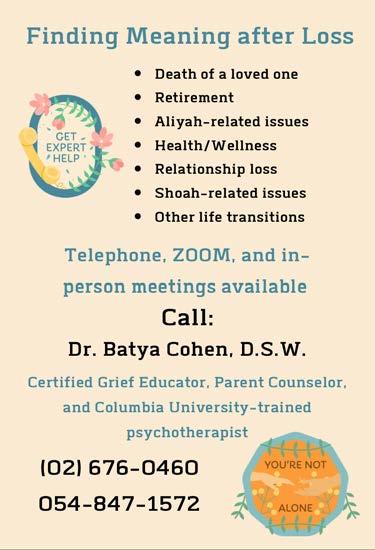
Hope, however, is not lost. Although the Land of Israel will be left empty and desolate there will be left a ‘trunk’ of the Jewish people that will eventually regrow.
STATS
17th of 54 sedras; 5th of 11 in Sh’mot Written on 138 lines in a Torah, (46th) 15 Parshiyot; 4 open, 11 closed 75* p’sukim - ranks 47th (only 7 sedras have fewer p’sukim)
1105 words, 4022 letters - ranks 46th Yitro is the smallest sedra in Sh’mot *Tradition is that Yitro has 72 p’sukim, not 75. If we count DIBROT rather than p’sukim for the Aseret HaDibrot, then the number drops to 72 (from 75) and that probably explains the difference.
HOWEVER... when we read the Aseret haDibrot with TAAMEI HA’ELYON (as Dibrot), there are only 9 p’sukim/dibrot, since the first two are definitely combined. Total: 71.
MITZVOT

Yitro contains 17 of the 613 mitzvot; 3 positive and 14 prohibitions
by Anne Chana Weiss
OU ISRAEL CENTER 15
In memory of Shimshon ben Meir Halevi z"l on his yahrzeit טבש ב"כ
THE PERSON IN THE PARSHA Fathers-in-Law
Very much has been written about most family relationships. There are books about fathers and sons, fathers and daughters, and mothers and sons and daughters. Many volumes have been written about relationships, typically rivalrous, between siblings.
But comparatively, little has been written about the relationship between father-in-law and son-in-law. Often, admittedly, there is little or no relationship between them. But just as often the relationship is an important and rewarding one.

I know that I personally have benefited immeasurably from my relationship with my father-in-law, of blessed memory. As is most often the case, I did not know him at all until my young adulthood, when I began to date his daughter. Unlike the father-son relationship, the relationship between
Religious Caregiver
 BY RABBI DR. TZVI HERSH WEINREB OU Executive Vice President, Emeritus
BY RABBI DR. TZVI HERSH WEINREB OU Executive Vice President, Emeritus

father-in-law and son-in-law usually begins in maturity and is, therefore, more of a relationship between equals, more man to man.
My father-in-law modeled his relationship to me after the precious relationship he had with his father-in-law. He would often joke that whereas a father couldn’t choose his son, he could choose a son-inlaw, to which I would usually respond, “Yes, true, and a son cannot choose his father, but a son-in-law can choose his father-in-law.”
In this week’s Torah portion, Yitro, we read of a very rich relationship between a son-in-law, Moses, and his father-inlaw, Yitro. Of course, we first read of their connection much earlier on in the book of Exodus. But in this week’s portion, the relationship begins to sound much more familiar to those of us who have “been there”.
May the Torah learned from this issue of Torah Tidbits be in loving memory of and תמשנ יוליעל our dear Mother
)Betty( הניב
ה"ע ןהכה בוד לרעב תב
On her 26 Yahrzeit - טבש ז"י
Born in the Ukraine and emigrated to the United States as a child, she imparted love of Torah Learning and the importance of Eretz Yisrael to her family.
Bruce & Yehudit Francis and family
16 TORAH TIDBITS 1504 / YITRO 5783
Car owner
Yitro travels to meet Moses and is the one who reunites Moses with his wife and children. They converse with animation and in great detail, each one narrating his story to the other. Moses narrates the story of the Exodus, of the splitting of the sea, and of the war with Amalek.
Yitro too tells a story, but it is a very different one. He tells of his religious quest, of his search for a God he can believe in. He informs Moses that he has dabbled in every conceivable type of idol worship. He has seen it all. And “now he knows” who the true God is.
Every son-in-law tells his father-in-law his story, although I suspect that often some of that story is suppressed. And every father-in-law, that is every fatherin-law worth his salt, shares his narrative with the young man who requests his daughter’s hand.
I remember telling my father-in-law some of my story. I remember some of the questions he asked me, and his disappointment when he discovered that I did not share his fascination with the game of chess.
But I can never forget the story he told me; not once, but throughout the more than forty years that we knew each other. His was a story of pre-Holocaust Eastern Europe, of a culture that is no more, a culture that he never ceased to mourn.
It is no wonder that the Torah characterizes the dialogue between Moses and Yitro by the word “vayesaper”, which means to tell a story. Most relationships consist of stories told by one party to the other. In the case of the father-in-law and son-inlaw relationship, these stories become
Specializing in American Immigration and Naturalization Law for over 30 years

Early filing critical due to Corona delays!!!

Member, AILA (American Immigration Lawyers Association)
Of Counsel to Bretz & Coven, LLP
www.bretzlaw.com
OU ISRAEL CENTER 17
3,700,000 NIS
US Citizenship for your Children and Grandchildren Michele Coven Wolgel Attorney and Notary
lawyer@wolgelaw.co.il Tel: 02
www.wolgelaw.co.il www.facebook.com/uscitizenshipinfo
590 3444
essential and, at least in my case, were lifelong narratives.
Yitro models another essential aspect of this unique relationship: He offers counsel, he gives advice. Not that Moses asked for Yitro’s opinion as to how he should conduct the judiciary system for his people. But Yitro assumed that it was his prerogative as a father-in-law to gently and constructively find fault in his son-in-law’s approach to things and offer reasonable alternatives.
I number myself among those fortunate sons-in-law whose father-in-law did not hesitate to occasionally criticize him, but who did so lovingly. He offered wise and practical suggestions which indeed were often drawn from his own past and sad, personal experiences.
It has been pointed out that the Hebrew word for a son-in-law is chatan, a bridegroom. I am convinced that this is because in the relationship between son-in-law and father-in-law, the former always remains the young bridegroom and the latter, the sage elder.

In the end, Moses asks Yitro to remain with him, the ultimate tribute that a sonin-law can pay to his father-in-law.
I would like to close with an original
thought, and if it is theologically daring, or in some other way off the mark, I beg the reader to forgive me.
It is a truism that God is our Father, and we are his sons and daughters. It strikes me that, in a certain way, God is also our Father-in-Law.
God as Father is the God with whom we began a relationship in our infancy. God as Father-in-Law is the God whom we freely choose, sometimes repeatedly, at later stages of our lives.
God is also our Father-in-Law because we have taken, so to speak, His daughter as our bride. The Torah has been described, by prophets and rabbis, as God’s daughter. And we, who have accepted the Torah, are betrothed to the daughter of God Himself. He entrusted His beloved princess to our inadequate and unreliable care.

But we asked for her hand. We accepted the Torah and committed ourselves to “doing and listening” to her words. If we are faithful to the Torah, we are demonstrating to our “Father-in-Law” that we deserve his daughter.
Only then we can claim a close relationship to Him, closer even than the relationship I had with my father-in-law, may he rest in peace.
18 TORAH TIDBITS 1504 / YITRO 5783
Probably a brilliant idea.. Who doesn't want to stay in his individual home instead of moving into a senior home?
I am ready to live together with you in your home. I am Rut Pnina born in Hamburg, a former teaching therapist, I speak German, Hebrew & English, in Jerusalem for 30 years, Shomeret Shabat.



I proved this model succesful. For futher details please contact pnina.mirza@gmail.com





















OU ISRAEL CENTER 19 On HaPalmach - great 4 room apartment, 92m plus large garden in use, exclusive. Asking 4.95 million NIS
- 4 rooms, beautiful, 105m, porch,
parking spots, machsan, asking 6.1million NIS Smadar 050-3114040 // 02-642-4329 smadi_bida@walla.co.il Spelt, GF Gluten Free Oat Hand and Machine. Distributed throughout Israel Visit our website for details including Hechsherim, & ordering: www.MatzaMan.co.il hillel.leib@MatzaMan.co.il
Palmach
2
Your Jewelry is Worth Gold! @Fancycolors vmkdiamonds.com vmk_diamonds Jewelry Manufacturer Upgrade your old Jewelry piece to a new modern design Best rate for broken and old gold pieces, inheritances Service in Hebrew | English | French | Italian Safe & Convenient Member of the Israel Diamond Exchange & the World Federation since 1997 Pay Cash 054-397-7707 Mishael Vardi
UNITED HATZALAH

israelrescue.org/jlmmarathon23


20 TORAH TIDBITS 1504 / YITRO 5783


OU ISRAEL CENTER 21 Hod Denya Jerusalem Assisted Living OCCUPANCY SOON! 14.02.2023 Tuesday | 6:30pm 22 Keren Hayesod, Jerusalem prestigious retirement residence Program Rabbi Dr. Nachum Amsel - Hod Denya Representatives of Bank Mizrachi Tefachotoptions for mortgages, loans etc.. Yehuda Oliva, Marketing Manager - Q & A For details and registration: 052-8319930 21 Golomb St., Jerusalem | Search Hod Denya on www.hoddenya.com Rabbi Dr. Nachum Amsel 0522-52-00-31 Namsel@netvision.net.il An Evening with Hod Denya at the OU Israel Center
COVENANT & CONVERSATION
To Thank Before We Think
The Ten Commandments are the most famous religious and moral code in history. Until recently they adorned American courtrooms. They still adorn most synagogue arks. Rembrandt gave them their classic artistic expression in his portrait of Moses, about to break the tablets on seeing the golden calf. John Rogers Herbert’s massive painting of Moses bringing down the tablets of law dominates the main committee room of the House of Lords. The twin tablets with their ten commands are the enduring symbol of eternal law under the sovereignty of God.
It is worth remembering, of course, that the “ten commandments” are not Ten Commandments. The Torah calls them asseret hadevarim (Ex. 34:28), and tradition terms them asseret hadibrot, meaning the “ten

words” or “ten utterances.” We can understand this better in the light of documentary discoveries in the twentieth century, especially Hittite covenants or “suzerainty treaties” dating back to 1400–1200 BCE, that is, around the time of Moses and the Exodus. These treaties often contained a twofold statement of the laws laid down in the treaty, first in general outline, then in specific detail. That is precisely the relationship between the “ten utterances” and the detailed commands of parshat Mishpatim (Ex. 22–23). The former are the general outline, the basic principles of the law.
Usually they are portrayed, graphically and substantively, as two sets of five, the first dealing with relationships between us and God (including honouring our parents since they, like God, brought us into being), the second with the relations between us and our fellow humans.
However, it also makes sense to see them as three groups of three. The first three (one God, no other God, do not take God’s name in vain) are about God, the Author and Authority of the laws. The second set (keep Shabbat, honour parents, do not murder) are about createdness. Shabbat reminds us of the birth of the universe. Our parents brought us into being. Murder is forbidden because we are all created
22 TORAH TIDBITS 1504 / YITRO 5783
תומשנ יוליעל ה״ע זייא דוד לארשי תב הדלוגו רשא בקעי ןב סחנפ ה״ע רטרש קחצי תב הינעמו בייל הירא ןב לאירזע
Thoughts on the Weekly Parsha from RABBI LORD JONATHAN SACKS ZT"L
Former Chief Rabbi of the United Hebrew Congregations of the Commonwealth
May the learning of these Divrei Torah be תמשנ יוליעל HaRav Ya'akov Zvi ben David Arieh zt"l
in God’s image (Gen. 9:6). The third three (don’t commit adultery, don’t steal, don’t bear false witness) are about the basic institutions of society: the sanctity of marriage, the integrity of private property, and the administration of justice. Lose any of these and freedom begins to crumble.
This structure serves to emphasise what a strange command the tenth is: “Do not be envious of your neighbour’s house. Do not be envious of your neighbour’s wife, his slave, his maid, his ox, his donkey, or anything else that is your neighbour’s.” At least on the surface this is different from all the other rules, which involve speech or action.1
Envy, covetousness, desiring what someone else has, is an emotion, not a thought, a word, or a deed. And surely we can’t help our emotions. They used to be called the “passions,” precisely because we are passive in relation to them. So how can envy be forbidden at all? Surely it only makes sense to command or forbid matters that are within our control. In any case, why should the occasional spasm of envy matter if it does not lead to anything harmful to other people?
Here, it seems to me, the Torah is conveying a series of fundamental truths we forget at our peril. First, as we have been reminded by cognitive behavioural therapy, what we

1 To be sure, Maimonides held that the first command is to believe in God. Halachot Gedolot as understood by Nachmanides, however, disagreed and maintained that the verse “I am the Lord who brought you out of the land of Egypt” is not a command but a prelude to the commands.
Jerusalem Real Estate is My Business
Eta: 054-723-3863 Rachel: 052-546-6425
Amazing stand alone homes in OLD KATAMON, TALBIYA, BAKA, GERMAN COLONY
Allenby Complex. Across from BAKA. 160 sqm penthouse quiet with views. 4 bedrooms & 2.5 bathrooms. Shabbat elevator, sukka terrace from living room plus roof top terrace 2 parking & storage. 6,400,000 NIS
Yemin Moshe beautiful property over 300 sqm. 2 private entrances (complete separate unit over 90 sqm). large garden. Close to parking & gorgeous architectural design newly renovated. Call for more info
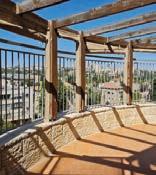

In the heart of BAKA enclosed in a magical courtyard: 3 bedrooms 2 full bathrooms one flight up. Beautiful spacious sukka terrace facing open gardens
Completely renovated with architectual design & high level finishes. 6,250,000 NIS

Penthouse near BAKA. 154 sqm on one floor with 4 bedrooms and 2 full bathrooms. Shabbat elevator, 2 underground parking and 3 storage units!!! 25 sqm Sukka terrace off living room plus large roof top terrace. 6,250,000 NIS

Eta Morris Realty, Ltd.

etamorrisrealestate@gmail.com
Eta: 054-723-3863 · Rachel: 052-546-6425
etamorrisrealty.co.il
OU ISRAEL CENTER 23
believe affects what we feel.2 Narcissists, for instance, are quick to take offence because they think other people are talking about or “dissing” (disrespecting) them, whereas often other people aren’t interested in us at all. Their belief is false, but that does not stop them feeling angry and resentful.


Second, envy is one of the prime drivers of violence in society. It is what led Iago to mislead Othello with tragic consequences. Closer to home, it is what led Cain to murder

2 This has long been part of Jewish thought. It is at the heart of Chabad philosophy as set out in Rabbi Schneur Zalman of Liadi’s masterpiece, Tanya. Likewise, Ibn Ezra in his commentary to this verse says that we only covet what we feel to be within our reach. We do not envy those we know we could never become.
Abel. It is what led Abraham and then Isaac to fear for their lives when famine forced them temporarily to leave home. They believed that, married as they were to attractive women, the local rulers would kill them so that they could take their wives into their harem.
Most poignantly, envy lay at the heart of the hatred of the brothers for Joseph. They resented his special treatment at the hands of their father, the richly embroidered cloak he wore, and his dreams of becoming the ruler of them all. That is what led them to contemplate killing him and eventually to sell him as a slave.
Rene Girard, in his classic Violence and the Sacred, 3 says that the most basic cause of violence is mimetic desire, that is, the desire to have what someone else has, which is ultimately the desire to be what someone else is. Envy can lead to breaking many of the other commands: it can move people to adultery, theft, false testimony, and even
Jews have especial reason to fear envy. It surely played a part in the existence of antisemitism throughout the centuries. Non-Jews envied Jews their ability to prosper in adversity – the strange phenomenon parshat Shemot that “the more they afflicted them the more they grew
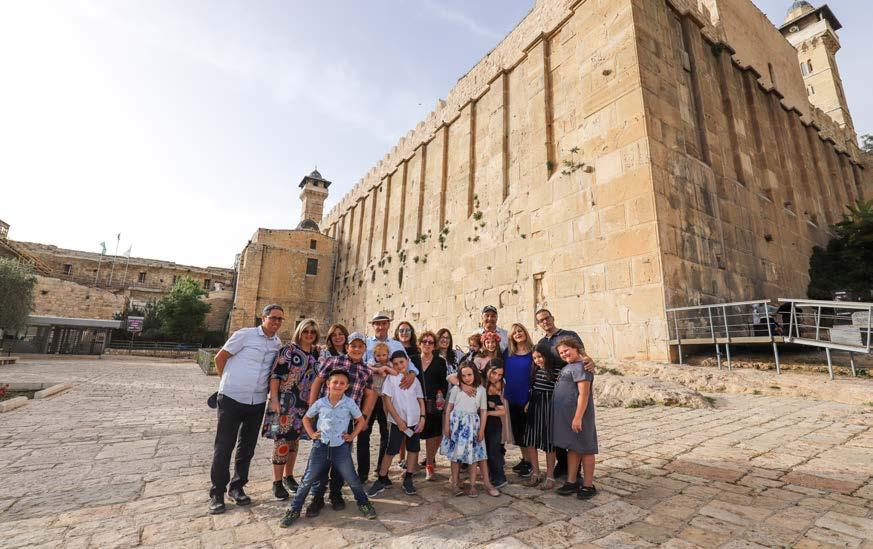
René Girard, Violence and the Sacred (Baltimore: John Hopkins University Press,
ut Schoeck’s classic, Envy: a Theory of Social Behaviour (New York: Harcourt, Brace & World, 1969). See also Joseph Epstein, Envy (New York: New York Public Library, 2003).
החמשב ןיברמ רדא Rosh Chodesh Hevron Tour 22 February 2023 PROGRAM • A Musical Rosh Chodesh Shacharit A scrumptious breakfast • Tour of Maarat HaMachpela Avraham Avinu Synagogue • Local Guest Speaker • Beit Hadassah www.lovingtheholyland.com Including transport & Breakfast ררחלא והילא ברה וירדהמל רשכ OUR GUIDE RABBI ALON ROGOFF Will share his passion & love for the land of Israel and our people. He frequently guides in Hevron & is excited to share his unique perspective of Hevron, City of Lovers. Rabbi Rogoff is a registered Israeli tour guide LIMITED PLACES FIRST TEN TO SIGN UP GET ₪100 DISCOUNT 058-693-1844
and the more they spread.” They also and especially envied them their sense of chosenness (despite the fact that virtually every other nation in history has seen itself as chosen).5 It is absolutely essential that we, as Jews, should conduct ourselves with an extra measure of humility and modesty.
So the prohibition of envy is not odd at all. It is the most basic force undermining the social harmony and order that are the aim of the Ten Commandments as a whole. Not only though do they forbid it; they also help us rise above it. It is precisely the first three commands, reminding us of God’s presence in history and our lives, and the second three, reminding us of our createdness, that help us rise above envy.

We are here because God wanted us to be. We have what God wanted us to have. Why then should we seek what others have? If what matters most in our lives is how we appear in the eyes of God, why should we want anything else merely because someone else has it? It is when we stop defining ourselves in relation to God and start defining ourselves in relation to other people that competition, strife, covetousness, and envy enter our minds, and they lead only to unhappiness.
If your new car makes me envious, I may be motivated to buy a more expensive model that I never needed in the first place, which will give me satisfaction for a few days until I discover another neighbour who has an even more costly vehicle, and so it goes. Should I succeed in satisfying my own envy, I will do so only at the cost
of provoking yours, in a cycle of conspicuous consumption that has no natural end. Hence the bumper sticker: “He who has the most toys when he dies, wins.” The operative word here is “toys”, for this is the ethic of the kindergarten, and it should have no place in a mature life.

The antidote to envy is gratitude. “Who is rich?” asked Ben Zoma, and replied, “One who rejoices in what he has.” There is a beautiful Jewish practice that, performed daily, is life-transforming. The first words we say on waking are Modeh ani lefanecha, “I thank You, living and eternal King.” We thank before we think.
Judaism is gratitude with attitude. Cured of letting other people’s happiness diminish our own, we release a wave of positive energy allowing us to celebrate what we have instead of thinking about what other people have, and to be what we are instead of wanting to be what we are not.
5 See Anthony Smith, Chosen Peoples (Oxford: Oxford University Press, 2003).
OU ISRAEL CENTER 25
WRITING A BOOK or READY TO PUBLISH ONE? www.kochavpress.com KOCHAV PRESS produces quality books at affordable prices. 058-578-8844
These weekly teachings from Rabbi Sacks zt”l are part of his ‘Covenant & Conversation’ series on the weekly Torah teaching. With thanks to the Schimmel Family for their generous sponsorship, dedicated in loving memory of Harry (Chaim) Schimmel. Visit www.RabbiSacks.org for more.

26 TORAH TIDBITS 1504 / YITRO 5783

OU ISRAEL CENTER 27
PROBING THE PROPHETS
BY RABBI NACHMAN (NEIL) WINKLER Faculty, OU Israel Center
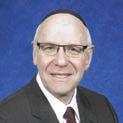
The vivid and dramatic vision seen by the navi Yishayahu in our haftarah is, as we have noted in earlier essays, the very first prophecy given to the prophet – despite the fact that it appears in the 6th perek of the sefer. The magnificent and awe-inspiring scene depicted by the prophet, the picture of Hashem seated upon His high and exalted throne with His “robe” filling the Heichal (Temple) – was chosen as the haftarah for this parasha of Yitro, a parasha that depicts G-d’s glory being revealed to all of Israel at Har Sinai.
And, while the theophany experienced by the entire nation would never again be repeated and was, therefore, the greatest divine revelation in history, the vision granted to Yishayahu included specific details of Hashem’s throne and His accompanying angels not found in the revelation at Sinai. The prophet describes these accompanying angels – seraphim - as possessing six wings: two wings covering their faces, two covering their feet and two used for flying. It is they who called to each other: “Holy, Holy, Holy is Hashem” (“Kadosh Kadosh, Kadosh”) “Whose glory fills the earth.” The vision was so powerful that we, simple human beings, had their chant incorporated into our tefilla, hence, our “kedusha”.
Some years ago, Phil Chernofsky pointed out that there was yet another part on Yishyahu’s vision that was incorporated into our tefilla: the phrase describing G-d as One Who seated upon “kiseh rahm v’nissa”, a high and exalted throne is used each Shabbat and Yom Tov when we say “HaMelech HaYoshev al kisheh rahm v’nissa”. Phil claimed, however, that the usual translation of the words as meaning that G-d sat upon a high and exalted throne was not correct. Rather, he argued, the phrase requires a comma after the word “kiseh”, throne, because the meaning of the text is NOT that the throne was “high and exalted, but that Hashem Himself is being described in those words, i.e., Hashem sits upon a throne and He (G-d) is high and exalted.

I will admit that I was not convinced. I felt that the adjectives “high” and “exalted” referred to the throne itself. I am happy –and humbled - to have seen another source who understood this phrase as Phil did.
In the collected essays found in “Worship of the Heart”, HaRav Soloveitchik sees the two terms, “rahm” and “nissa” as expressing an exaltedness and loftiness that is beyond the created universe, something that is transcendent. Therefore, writes the Rav, Yishayahu in this vision,
28 TORAH TIDBITS 1504 / YITRO 5783
Rabbi Winkler's popular Jewish History lectures can be viewed by visiting the OU Israel Video archive: https://www.ouisrael.org/video-library
portrays a paradoxical view of G-d. In one aspect, Hashem remains distant from, and far above, His creations; He is “rahm”. On the other hand, He is also “nissa”, which Rav Soloveitchik understands as a passive verb – that is, He can be “acted upon”, He can be “influenced” by others and can be impacted by them.
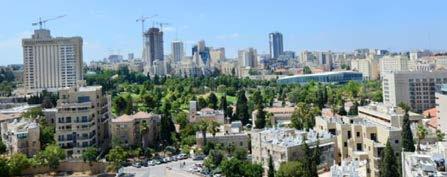
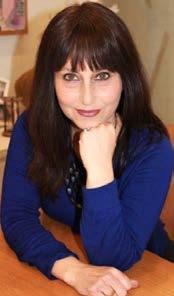
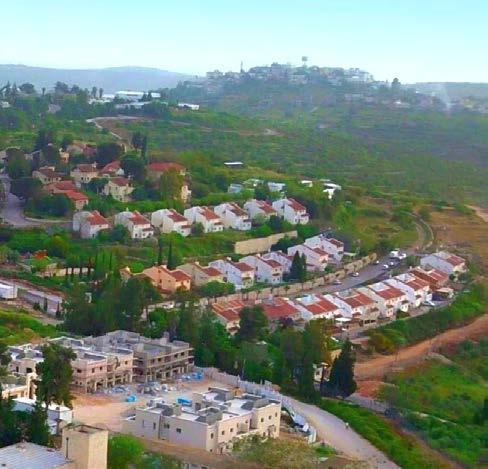
This unique attribute of G-d is most evident in the act of prayer. How remarkable is it that we refer to Hashem as one Who is “Shome’ah Tefilla”, “sensitive” to prayer; one Who listens and responds to our supplications. How often during our tefillot do we realize the remarkable act of connecting to One Who is “rahm”? How common is our realization that we are be able to speak to the very Creator Who stands far above His very creations who pray to Him?? Do we really appreciate the fact that G-d is not only “rahm” but is “nissa”, allowing Himself to listen to our entreaties?
The “danger” of our daily prayer is that we become far too comfortable with it. How more meaningful would our tefillot be if, every now and then, we remember that the “RAHM” bends His ear and becomes a “NISSA”, to respond to His people?!
Mazal Tov to Baruch & Elisheva Cohen on the birth of their daughter

and to the Grandparents:

OU President: Mitch & Lita Aeder and Fred & Lyn Cohen

OU ISRAEL CENTER 29
All units have water views 5 Minute walk to the beach Prices start at 5MNIS For more information: Ir Yamim, Netanya Ir Yamim, Netanya New Tower New Tower 4 Bdrm Apts. for Sale 4 Bdrm Apts. for Sale Jerusalem Jerusalem New Projects New Projects 45,000NIS per SQM 45,000NIS per SQM
ISRAEL'S REAL ESTATE ISRAEL'S REAL ESTATE ESTATE MATCHMAKER MATCHMAKER
Why Didn’t Moshe Establish a Hierarchical System Before Being Advised By Yitro?


After Moshe greets his father-in-law, he returns to his routine. Yitro witnesses the long lines of people awaiting a meeting with Moshe and realizes that this situation is doomed to fail. Moshe cannot single handedly teach and judge the people. Yitro suggests setting up a hierarchical system whereby simple issues are dealt with by others and complicated issues are brought to Moshe. Why did we need Yitro to devise this judicial system?
Some view Bnei Yisrael as vagabonds who wandered around in the desert and who never experienced a civilized society. Yet, they lived in Egypt, which was one of the most advanced and civilized nations at the time. There was certainly an established judicial and court system in Egypt to handle disputes and to interpret the law. In fact, Moshe Rabbeinu grew up in the palace and was definitely familiar with the judicial system in Egypt. He also served as
Nitza, min. 1 month, Amazing sea view, Kosher, Discounts on February & March, Furnished & equipped, wifi
the Rav of the people and had to Paskin on behalf of everyone. It was impossible for this one-man-show to manage the entire nation. Why didn’t Moshe himself institute a judicial system in the desert, based on what he witnessed in Egypt? Why did he need Yitro to convince him of its merit?
Rav Adin Steinsaltz A”H, offers an intriguing explanation. Moshe did not focus solely on the practicalities of the matter, but rather was influenced by his hashkafa. Moshe understood that Yitro’s philosophy was more effective, but Moshe did not want to establish a hierarchy. He believed everyone was created equal. He did not want to have certain individuals perceived as being above others. Moshe consistently viewed
30 TORAH TIDBITS 1504 / YITRO 5783
RABBI SHALOM ROSNER
Rav Kehilla, Nofei HaShemesh Maggid Shiur, Daf Yomi, OU.org Senior Ra"M, Kerem B'Yavneh
NETANYA 4 ROOM APT. RENTAL
APTNETANYA@GMAIL.COM
all as equal. Below are several examples highlighting this point.
Har Sinai
When Am Yisrael requests that Moshe speak to them rather than hear the commandments directly from Hashem, Moshe hesitates. Moshe believes that everyone should strive to be able to speak with God directly and not through an intermediary. Moshe asks for God’s permission and only thereafter proceeds to relay the commandments ( Davarim 5:24).
Eldad and Meidad
When Eldad and Meidad are prophesizing in the camp, Yehoshua informs Moshe and suggests they be imprisoned. Moshe responds:
. “Are you zealous for my sake? All of God’s people are prophets, for Hashem bestows His spirit upon them!” (Bamidbar 11:29). Moshe responds that just as Eldad and Meidad received their prophecy from God, so too all of the people should be granted with prophecy. Moshe does not need to be distinguished from others as a prophet.
Wise Nation
The Torah itself depicts Am Yisrael as being wise –

“Only this great nation is a wise and
understanding people.” (Devarim 4:6). Each individual should strive to be as wise as possible. To reach for the stars and maximize one’s potential.
Moshe viewed each individual as being equal. This is actually the claim Korach raised when he stated: םישודק
– “all are holy” (Bamidbar 16:3). Moshe wanted to allow everyone to access him. People should not be restricted or limited to asking questions to other individuals and only certain people can approach Moshe. Creating a hierarchy would label certain individuals as being smarter or greater than others. That would tilt the balance among the nation. That is why Moshe needed Yitro to convince him that from a practical point of view, to properly manage the nation, there was no choice but to establish a certain judicial system with a chain of command.
However, just because there is a hierarchy, does not mean that a class system needs to be established with first and second class citizens. Those holding public positions need to understand that they are not above others, or above the law. They are there to serve the people. We need to follow Yitro’s advice and establish a workable system, while maintaining Moshe’s hesitation, and ensuring that all are treated as equal.
OU ISRAEL CENTER 31
ֹוחּור־תֶא 'ה ןֵּתִי־יִּֽכ םי ִאיִבְנ 'ה םַע־לָּכ ןֵּתִי י ִמּו םֶֽהיֵלֲע
לֹודָּגַה יֹוּגַה ןֹו בָנְו םָכָח־םַע ק ַר –
הֶּֽזַה
םלכ הדעה לכ
Securities offered through Portfolio Resources Group. Inc., member of FINRA, SIPC, MSRB, SIFMA US BROKERAGE SERVICES IN ISRAEL Get the Best of Both Worlds Keep your money in the US and receive local expert investment advice 02-624-0995 054-599-9530 aaron@lighthousecapital.co.il www.aaronkatsman.com CALL
Real Life Rescues
Restoring Resiliency After A Terror AttackA First-Hand Account From the First Responder at the Neve Yaakov Terror Attack in Jerusalem that Claimed The Lives of Seven and Injured Numerous Others
By: Chanoch Reem
This past Friday night at 8:13 P.M., I was seated at the dinner table with my family when I heard on my communications device reports of a terror attack on Sderot Neve Yaakov, not far from my home. Without hesitation, I left everything behind and raced to the scene.

As I approached, I saw the horror unfold before me, and it was indescribable. A terrorist was ruthlessly gunning down innocent people. A woman was shot five times in front of my eyes. I immediately took cover, and as the first EMT on the scene, I reported on the communications device the presence of an active shooter, emphasizing that no one should start providing treatment until I am given the okay by the police that the shooter is gone or neutralized. After one police officer gave me the clearance, I double-checked with another officer, feeling the heavy responsibility on my shoulders of informing all of the volunteers that they could go in.
When I entered the scene of the shooting attack, I was met with the devastating sight of three people lying on the floor in pools of blood, motionless. I checked for their pulse and breathing and tragically, two of them were already beyond help. I followed protocol by not performing CPR.
The third individual, a man, was still alive and conscious. He had sustained a gunshot wound in the abdomen. In shock from just witnessing his father's murder, the man initially refused to be treated. Later I noticed that one of our paramedics had convinced him to be evacuated to the hospital. A bit further down the road, a woman was found unconscious but alive. She was in critical condition. After I helped provide initial treatment to her in the field, I assisted in transferring her to an intensive care ambulance for immediate transport to the hospital. I later learned that her death was declared upon arrival at the hospital. She too seemed to have been beyond our help.
In the aftermath of such a traumatic scene, where I came across numerous people who were beyond our help, I was left with a feeling that in spite of my best efforts, I wasn’t able to save these people. I was grateful for the quick response of United Hatzalah's Psychotrauma and Crisis Response Unit, whose members arrived at the scene to provide psychological first aid and emotional stabilization to eyewitnesses, the victims' relatives, and to us, the first responders, who were also deeply affected by the horror we had just witnessed. The treatment they provide at the scenes of medical emergencies that have a tragic or difficult ending is nothing short of extraordinary. In a time when many people feel helpless, and feel that control has been taken away from them. This unit comes to reassure people that not only do they have control over their lives but that they are not alone. These two powerful realizations have been shown to help prevent the onset of an emotional stress reaction which, if left untreated, can turn into PTSD. Just as I arrived to provide medical care, this unit provided me, and many others with psychological care. They have continued accompanying us since Friday night, giving up their own Shabbat celebrations, in order to help us recover from these horrific sights, so that we avoid bearing a heavy emotional toll, and restore our resilience so that we can respond once again, should another emergency arise.
I am proud to volunteer with United Hatzalah and to have helped at least some of those who were injured in Friday night’s heinous attack, even if I wasn’t able to save them all. I know that each of the responders that night, Jewish and Muslim alike, myself included, did everything we could to save as many lives as possible in the face of such a tragedy. We hope for better days when these terror attacks and acts of violence cease, and we will continue to stand together, ready to respond to those in need until they do, and beyond.

32 TORAH TIDBITS 1504 / YITRO 5783
1221




























OU ISRAEL CENTER 33 FOR ALL REFINISHING WORK VALUED OVER 1,000 NIS, YOUR CHOICE OF PREMIUM LEG TIPS + 1 FURNITURE MARKER FREE!* 1898 2023 RECEIVE FREE STANDARD LEG TIPS ON ALL CHAIR GLUING* RECEIVE FREE STANDARD LEG TIPS ON ALL CHAIR GLUING* ****************RESTORE YOUR FURNITURE TO HEALTH **************** Website: www.thefurnituredoctor.co.il Email: office@thefurnituredoctor.co.il Phone: 02-999-2418 WhatsApp: 058 787 3755 *VALID FROM FEBRUARY 10-23, 2023 *LIMIT OF ONE PROMOTION PER CUSTOMER 125th YEAR ANNIVERSARY The Furniture Doctor's Helpful Tip #1 Never lean back on chairs. This puts stress on the back legs & severely weakens the joints OTHER OPTIONS RAMAT BEIT SHEMESH I JERUSALEM I ASHDOD I ASHKELON I RANANA I TIBERIAS I TZFAT I MODIIN I TEL AVIV I CEASAREA I AND MORE Toviyah050 446 9515 Daniel 053 444 0928 Sara 054 456 9998 Lara 058 661 1968 Yehuda 052 564 0130 Debbie 058 322 9858 GUIDING YOU EVERY STEP OF THE WAY HELPING YOU SECURE YOUR FUTURE IN ISRAEL WITH PROPERTY OWNERSHIP AND INVESTMENT Various Projects and options tosuiteall budgets Ideal to live Invest = High Demand 4,5 Rooms Mountain & sea Views and Ideal for Investment TZFAT PROJECTS JERUSALEM PROJECTS Tel/WhatsApp IL +972 50 446 9515 | Office +972 2 568 6578 www.israel-properties.com | toviyah@israel-properties.com 3,4,5 Rooms Projects and Options to Suite all Budgets Walk to Beach Sea View = NETANYA
Walk toBeach Sea ViewsClose to Light Rail be in Tel Aviv in 15 Minutes BAT
Luxury new Projects 3,4,5 Rooms Gardens and Penthouses = RANANA
HighDemandValley or park views 4,5 rooms and Penthouses = NEVESHAMIR
PROJECTS
YAM PROJECTS
PROJECTS
PROJECTS
Bountiful Brachot
“Hi, how are you?” “Baruch Hashem!” We say and hear these two words all day long. But where did it come from? Interestingly, it was Yitro who first articulated this gratitude to Hashem (Shemot 18;10). Chazal (Sanhedrin 94a) even critique the Jewish people for not expressing thanks to Hashem for His benevolence with these words. This is a bit puzzling, since the Jews did sing Shirat Hayam, the Song at the Sea, and absolutely praised Hashem for their salvation. What is special about specifically using the word “Baruch” to thank and praise Hashem?
Rav Yisrael Druk quotes his father, Rav Mordechai Druk in Eish Tamid, who explains that indeed Am Yisrael glorified Hashem for their personal deliverance. Yitro, on the other hand expressed his
thanks and praise to Hashem for saving others, namely, Am Yisrael. Chazal tell us that Yitro was pained by the punishments inflicted on the Egyptians yet, simultaneously, he was able to acknowledge the wonders Hashem did for the Jewish people. Am Yisrael’s gratitude was completely focused on their own experience, it lacked the element of gratitude for the good done to others.
Lachzot B’noam suggests that this idea gives us a deeper understanding of what Chazal tell us, “kol hamesameach chatan vekallah k’ilu bana achat mechurvot Yerushalayim – one who gladdens a bride and groom is considered as if he rebuilt one of the ruins of Yerushalayim.” Generally, we understand this to mean that by rejoicing with the young couple we recognize that their new home, a new mikdash me’at, is rebuilding Yerushalayim and bringing the redemption one step closer. However, Yitro’s attitude gives a deeper insight here. The one who gladdens others is responsible for rebuilding the ruins of Yerushalayim and bringing the redemption closer. Yerushalayim was destroyed because of sinat chinam, baseless hatred. When one gladly rejoices with another

34 TORAH TIDBITS 1504 / YITRO 5783 REBBETZIN SHIRA
SMILES Faculty, OU Israel Center
רואלהאצוהוסופדתוקפה Quality printing of Sifrei Kodesh Specialists in hard and soft cover seforim. Premium print, binding and cover quality! Experienced team offering world class customer service and support! Orders from 300 copies or more. Delivery straight to your door! beit hadfus st. 30 Jerusalen.Israel office@yochai-print.com yochai-print.com +972-527151736 For Hebrew speakers call 972 -527158749 +
in their joy, this is ahavat chinam, a true expression of limitless love.
Rav Yisrael Druk offers a further insight elucidating the difference between the praise the Jewish people offered to Hashem, and the gratitude Yitro expressed with the words, “Baruch Hashem.” Rav Chayim Volozhiner explains in Nefesh Hachayim that when one says a brachah, he infuses an added dimension of spiritual energy and goodness into this world. Hence, Chazal refer to one who eats without making a bracha as a “thief” (Brachot 35b). In addition to taking something from Hashem’s world without permission, he is “stealing” by denying a greater spiritual abundance that could and should have come to this world. This is the power of brachah, of bringing even greater goodness into the world, that was lacking in the Shirah after
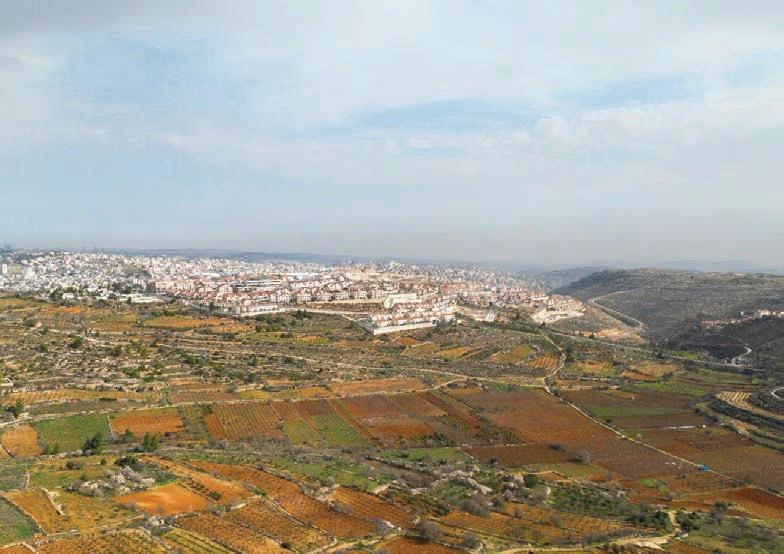
Keryiat Yam Suf.
Rav Shlomo Zalman Auerbach z’l, offers a fascinating example highlighting the distinction between thanking and blessing. If one borrows money from another person, he can say “thank you” to show appreciation. However, one may not offer a blessing, since that would be considered “ribit b’dvarim,” a form of interest. How so? Blessing is a medium that brings in its wake much goodness and prosperity, if one returns a favor with a blessing, he is paying back far more than he originally received.

“So, how are you?” “Baruch Hashem!” The power of appreciating the goodness done to others and the power of goodness we can bring to this world. We can share Yitro’s message in countless interactions, all day long.


OU ISRAEL CENTER 35
Scan to visit our site A SELECTION OF OFF-MARKET PROPERTIES AVAILABLE IN EFRAT AND GUSH ETZION www.noamhomes.com Real Estate | Investments | Management services BS″D Scan to visit our site www.noamhomes.com Real Estate | Investments | Management services www.noamhomes.com | office@noamhomes.com Look for us: NOAM HOMES Noam Homes Even Sapir 24, Jerusalem 058-793-2222 2020 2021 From your friends at NOAM HOMES Real Estate Professionals The TOP 10 Real Estate Office in Jerusalem for 2020 & 2021 (MADLAN) HAPPY Passover NACHLAOT Great Investment Property, devided into 3 units! Beautiful duplex, built to a high standard! Lot with unique villa with Apartment Complex and private garden! Authentic 5.5 room Home with character and beauty! MALCHA NACHALAT ACHIM GERMAN COLONY Noam Homes Scan to visit our site Look for us: NOAM HOMES Noam Homes 24 Even Sapir St., Jerusalem 058-793-2222 office@noamhomes.com FOR MORE INFORMATION CALL NOA: 052-870-2387 Scan to WhatsApp Noa Noa Vasl Resident of Efrat
Mashpiah, OU-NCSY Executive Director, Camp HASC Author of Baderech: Along the Path of Teshuva (Mosaica 2021)

Where God is Found
Rebbe Shlomo Halberstam, the Bobover Rebbe, zy’a, of the post-Holocaust era, revived his community with love, resilience and faith. The Rebbe restored kavod to thousands of survivors and helped them rebuild their lives, and was the paradigm of fatherly love, chein v’chesed, grace and righteousness.
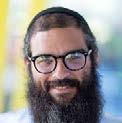
Family weddings in Bobov were majestic; thousands joined the Rebbe to share in the celebration, dancing into the wee hours of the morning. For all the survivors, their families and the community, s’machos uplifted them with a sense of victory, affirmation, continuity, faith and celebration. All felt certain that Netzach Yisrael lo yishaker, “The promise of the eternity of Am Yisrael is true.”
At the height of the dancing and fervor, the Rebbe took a breather and stood at his shtender. Scanning the thousands of revelers, the Rebbe caught sight of an elderly chasid dancing, his arms on the shoulders of a taller chasid in front of him in the
circle. The Rebbe called over a young man who was nearby and whispered to him, “Ti mir a toiveh, please do me a favor: go stand between that elderly Yid and the tall fellow in front of him, so that the zakein need not exert himself and have to stretch uncomfortably during the rikud.”
Amid such rejoicing and d’veikus, the Rebbe not only perceived the vulnerability and possible discomfort of another person, his mind computed and communicated a solution. At the height of his spiritual bliss, the Rebbe remained aware of the seemingly minor need of another.
He sent word to Moses, “I, your father-inlaw Yisro, am coming to you, with your wife and her two sons.” (18:6)
Our Sages describe Yisro as a spiritual seeker who traveled the world, experiencing a multitude of paths, faiths and idolatrous practices. Rav Simcha Zissel, the Alter of Kelm, puts his finger on what drove Yisro’s search: until he came in contact with Yiddishkeit, Yisro had understood the goal of spirituality to be transcendence and escape from the day-to-day reality of this world. As much as one might desire to escape the mundanity of this world, this is indeed an elusive goal.
Rashi notes that Yisro’s comment to his son-in-law Moshe reflects the life-changing
36 TORAH TIDBITS 1504 / YITRO 5783
RABBI JUDAH MISCHEL
ינשו
המע הינב
ךתשאו ךילא אב ורתי ךנתח ינא השמ לא רמאיו
donated by Marion & Michael Silman Ita Rochel 02-560-9125
BY WYNDHAM JERUSALEM
BY WYNDHAM JERUSALEM

Passover is just


Passover is just around the corner. Make your reservations today!
the corner. Make your reservations today!

around
Pesach at the Ramada Jerusalem …because you deserve it!
Pesach at the Ramada Jerusalem …because you deserve it!
Pesach at the Ramada Jerusalem …because you deserve it!

Spacious & airy rooms | family oriented | heated indoor pool and tness center | highest standard of kashruth: Jerusalem Rabbinate Mehadrin, OU Glatt, Shmitta L'Chumra, ,Non-gebrochts, no Kitnoyot | Sumptuous festive meals | cultural programming, lectures and quality entertainment for the entire family
Spacious & airy rooms | family oriented | heated indoor pool and tness center | highest standard of kashruth: Jerusalem Rabbinate Mehadrin, OU Glatt, Shmitta L'Chumra, ,Non-gebrochts, no Kitnoyot | Sumptuous festive meals | cultural programming, lectures and quality entertainment for the entire family
Take it easy - Shabbat Hagadol at Ramada Hotel
Spacious & airy rooms | family oriented | heated indoor pool and tness center | highest standard of kashruth: Jerusalem Rabbinate Mehadrin, OU Glatt, Shmitta L'Chumra, ,Non-gebrochts, no Kitnoyot | Sumptuous festive meals | cultural programming, lectures and quality entertainment for the entire family

Take it easy - Shabbat Hagadol at Ramada Hotel
Take it easy - Shabbat Hagadol at Ramada Hotel

For reservations: 02-6599950 | www.ramadajerusalemhotel.com | reservations@ramadajerusalem.com
For reservations: 02-6599950 | www.ramadajerusalemhotel.com | reservations@ramadajerusalem.com
For reservations: 02-6599950 | www.ramadajerusalemhotel.com | reservations@ramadajerusalem.com
OU ISRAEL CENTER 37
insight he’d learned from taking in the Torah perspective: “If you will not come out for my own sake, come out for the sake of your wife; and if you will not come out for your wife’s sake, come out for the sake of your two sons.” Yisro reminds Moshe that Yidishkeit is not just about our own transcendence. Being a leader and teacher of Klal Yisrael cannot come at the expense of ‘normal’ social, cultural and familial responsibilities.
When we bring to mind a ‘holy moment’ or envision a ‘spiritual person’, we might think of someone with their eyes closed, ‘vertically’ focussed, reaching beyond this world. Interacting with a ‘mundane moment’ or being a ‘people-person’, by contrast, is characterized by a ‘horizontal focus’, reaching out to the world. These two modes of being seem to be mutually exclusive, however Yidishkeit insists that we be completely given over to both. We must pursue our inner, vertical world, and simultaneously to the minutiae and needs of the outer, horizontal world.
And this is why truly holy people, even amid their ‘biggest’ moments, notice little things. Even when our service of Hashem and fulfillment of mitzvos is flowing with passionate devotion, intensity, focus or transcendent d’veikus, we can still remain aware of the needs and wellbeing of those around us. The text of tefillah doesn’t actually take us out of the world — it awakens us to the needs of the world and focuses our devotion on taking responsibility for others. This
GET FIT WHILE YOU SIT: Exercise for ladies
Join us on Sundays 12:45-1:30pm at the OU Israel Center Sura Faecher 0504153239
reminds us that our ‘vertical’ striving is not in conflict with our ‘horizontal’ connectivity.
God is found within people and between people — within all of our relationships. The Heichal haBracha, the Rebbe of Komarna, zy’a, teaches that the relationship between love of others and love of God is hinted to in the gematria, the numerical value of Ve’ahavta lerei’acha kamocha, ani Hashem: 907. It is the same value as Ve’ahavta es Hashem Elokecha, “And you shall love the Eternal One, your Divinity.” This ‘equating’ of the two mitzvos reveals that Ve’ahavta, too, is rooted in God’s Oneness.
The first discourse that the Lubavitcher Rebbe delivered on the upon accepting the mantle of leadership of the Lubavitch movement was a ‘statement’ that the three loves — love of God, love of the Torah and love toward a fellow Jew — are all one, intertwined and a veritable unity. They are in no way three competing values; they are two complimentary sides of one coin. Fulfilling V’ahavta completes the mitzvah of Ahavas Hashem, bringing us closer and deepening our bond with the Ribbono shel Olam. The Alter Rebbe explains that the mitzvah of V’ahavta l’re’acha kamocha is a commentary on the commandment V’ahavta es Hashem Elokecha.
May Yisro’s reminder to Moshe Rabbeinu serve to refocus our own attention on those who are closest to us. And may we all draw close to Hashem, together.
A small Sefer Torah with its own Aron Kodesh is available to shiva houses or for any other necessary occasion on a temporary free-loan basis. If needed call Uri Hirsch 0545513173
38 TORAH TIDBITS 1504 / YITRO 5783
SHIUR SPONSORS










Monday, February 6th - Rabbi Aaron Goldscheider’s shiur on Tu’shvat was sponsored תמשנ יולעל
ל”ז הדוהי באז ןב יכדרמ בקעיEugene M Fischer z”l by Ethel Fischer & family
Tuesday, February 7th - Shira smiles shiur was sponsored by Joakim Isaacs in loving memory of his Aunt Rebecca Isaacs a”h - Rivka bat Abraham v’Rochel a”h
Tuesday, February 7th - Shira smiles shiur was sponsored by Miriam Kowall for a refuah Shleima for her father היח ןב והימרי
Sunday, February 12th - all morning shirium are sponsored by the Finson and Budow families in memory of Shelly Budow a”h ה”ע האל המחנ תב תימלוש and Mashie Tekuzener a”h ה”ע האל המחנ תב הכעמ השאמ
Yahrzeit - Sunday February 12th
Rabbi Goldscheider’s shiur has been sponsored for the 2023 Academic Year

ל’’ז המלש ןב בוט םשו ה’’ע םהרבא תב םירמ תמשנ וליעל
Rebbetzin Shira Smiles shiur is sponsored for the 2023 academic year by Dr. & Mrs. Menachem Marcus in memory of their parents, Rose & Dr. Emanuel Marcus z”l -
ל”ז סוקרמ השמ ןב יכדרמו ריאמ ףסוי תב לזייר Rosi and Ernest Strauss z”l -
ל”ז סוארטש דוד ןב לאינדו םהרבא תב דומיל
Rabbi Breitowitz’s Tuesday Shiur - Minchat Chinuch is sponsored for the academic year 2023 by Rabbi Refoel & Sharon Auman in memory of their parents Edith & Reiner Auman z”l
ד”יה לאפר תב ה”ע רתסאו ל”ז קודצ ןב הנוי and their son Rabbi Shmuel Eliyahu Auman z”l
י”נ לאפר ברה ןב ל”ז והילא לאומש ברה
Rabbi Goldin’s shiur is sponsored for the 2023 academic year by Dr. & Mrs. Menachem Marcus in memory of beloved aunts Irma Haas a”h and Hilde Myer a”h
Rabbi Manning’s shiur has been sponsored for the 2023 academic year

ל’’ז ןמלק ןב גילזו ה’’ע תידנרב תב הנרב תמשנ יוליעל
Rabbi Taub’s weekly Thursday Parshat HaShavua Shiur is sponsored by The Jewish Legacy Foundation


OU ISRAEL CENTER 39 ORDER ONLINE AND GET THE PRODUCTS YOU PREFER DELIVERED STRAIGHT TO YOUR DOOR! ORDER TODAY AND ENJOY SUPERIOR QUALITY, SELECTION AND SERVICE! Use coupon code welcome2ftf and save 5% off your first order! www.FarmToFamily.co.il Netanel 050-344-6261 | Office 058-444-6260 American Service! Want to shop from the convenience of your home? American Products & Specialty Items! Top quality, organic & regular Mehadrin produce “TzviAir is a pleasure to work with and did an amazing job!” – Jamie Geller, Celebrity Chef AIR CONDITIONING SALES & SERVICE 02-628-8282 | tzviair.com Gemach for Chatan and Kalla: Meals for wedding and Sheva Brachot at cost Eida Hachareidis Hechsher Tel:052-633-1744 gadgadood@gmail.com
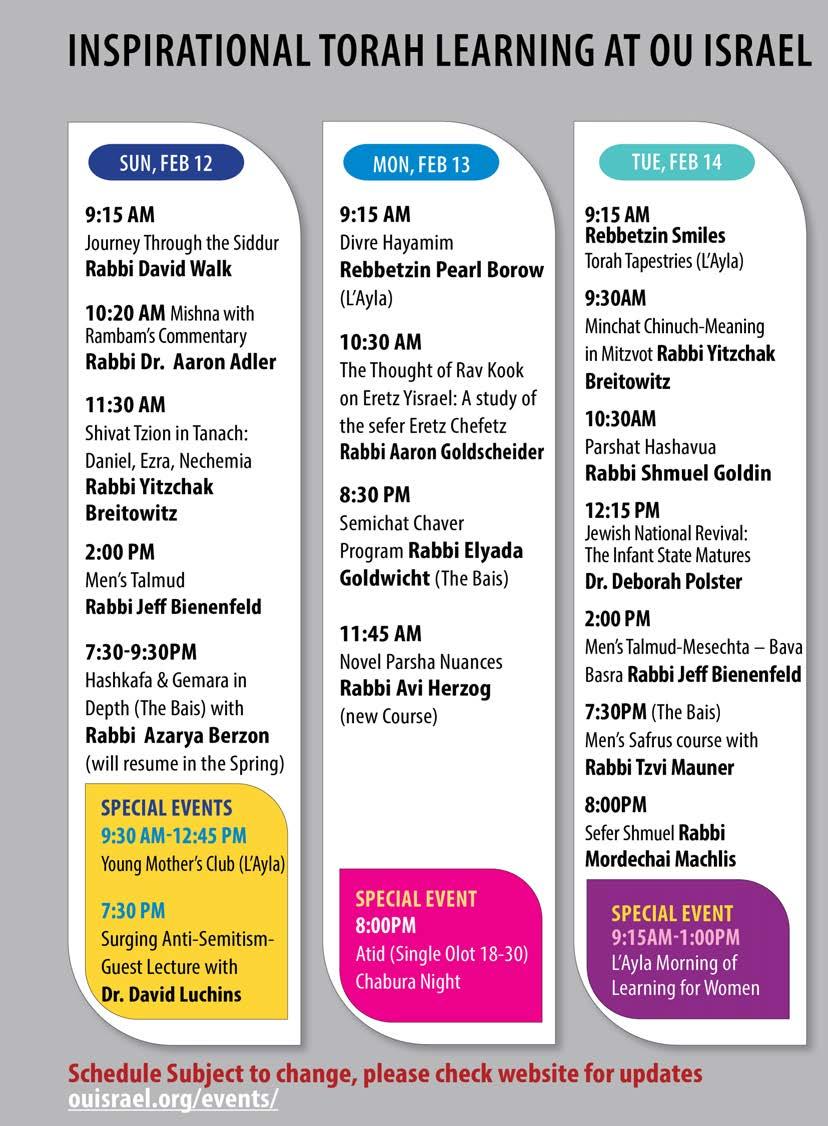
40 TORAH TIDBITS 1504 / YITRO 5783
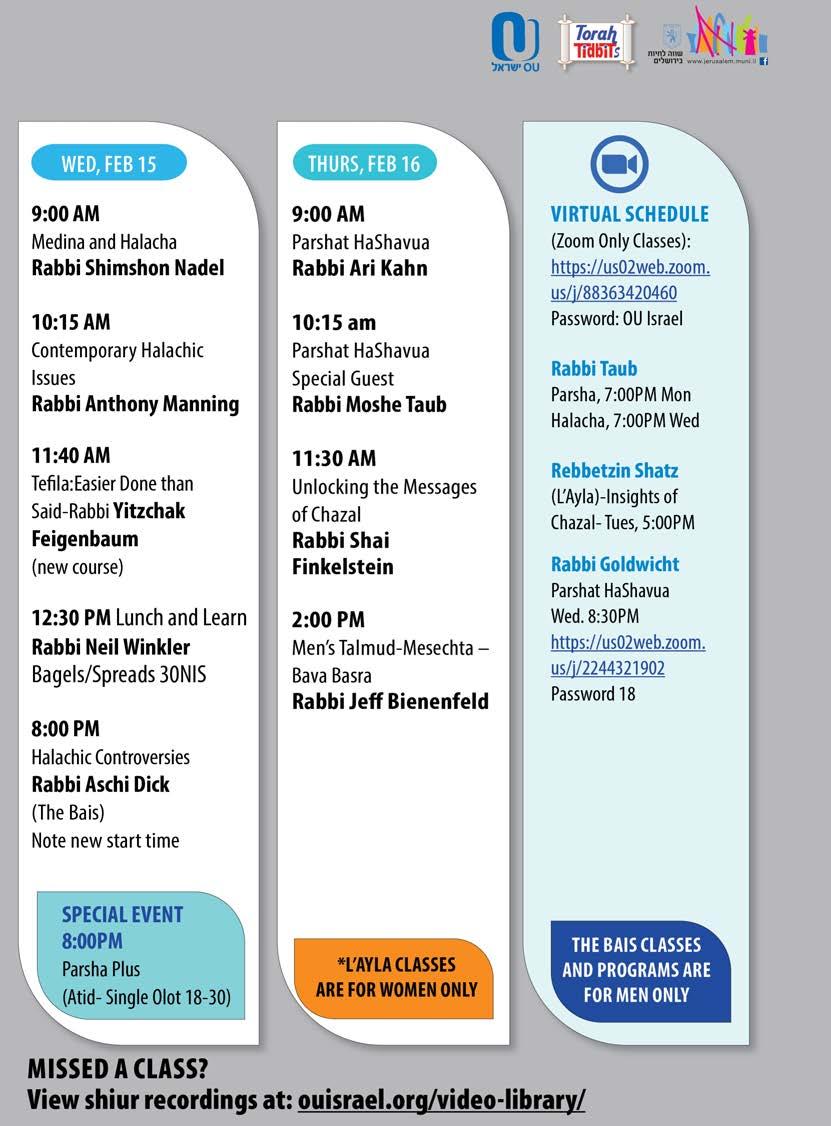
OU ISRAEL CENTER 41


42 TORAH TIDBITS 1504 / YITRO 5783
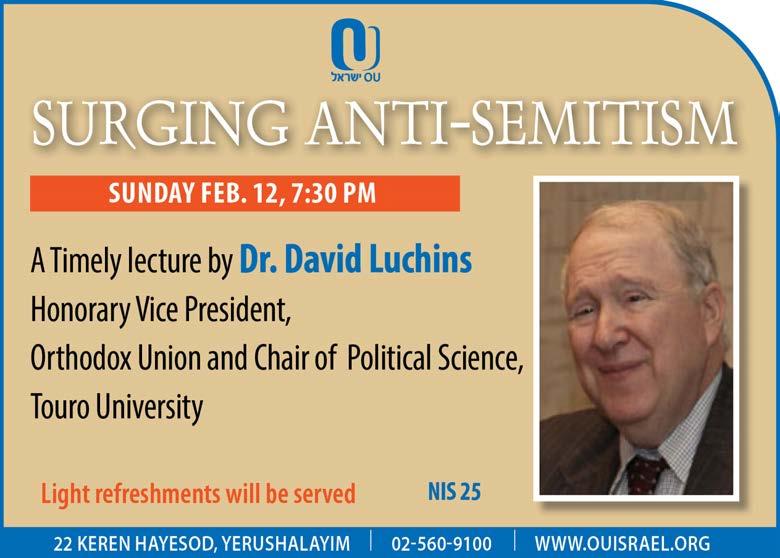
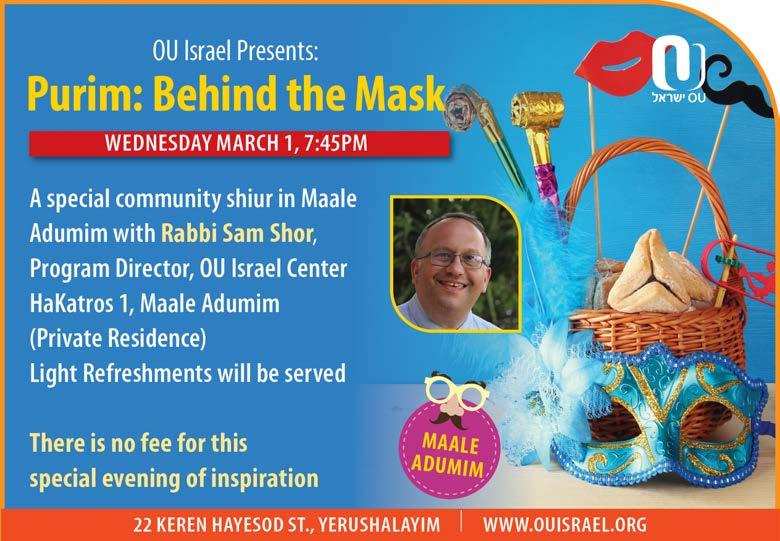
OU ISRAEL CENTER 43
This week: Funds urgently needed for false teeth for elderly, sick man (the portion not covered by Kupat Cholim)

• Checks: Make out to “Yesh Ezra” Send to: Yesh Ezra, POB 36156, Romema, Jerusalem
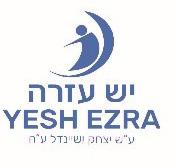
• Bank Transfer: Bank Mercantile (17), Branch 642, A/C 79747843, Yesh Ezra
• Credit card by phone: Sara at 077-820-0196 (Sun-Thu. 10:00am-3:00pm)
• Website: www.yeshezra.org Click on “Donate Now”
Inquiries: Menachem Persoff 050-570-1067

menpmp@gmail.com

44 TORAH TIDBITS 1504 / YITRO 5783




OU ISRAEL CENTER 45 Join OUr Purim Campaign Donate through our website www.ouisrael.org/purim Give Pre-Purim Mishloach Manot to heroic IDF soldiers, including OU Israel Youth Centers alumni Price: $18 / NIS 70 רעונה יזכרמ בלב םוקמ אתיירואד or scan the code Donations made to the OU Israel are tax deductible


46 TORAH TIDBITS 1504 / YITRO 5783
DOROT - The OU Women's Intergenerational Choir
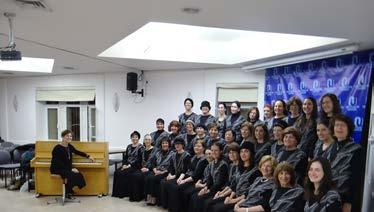
Director Hadassah Jacob 052-384-7230

Monday Evenings 7:00 - 9:00pm
PRI HADASH
WOMEN'S WRITING WORKSHOP AT THE OU ISRAEL CENTER
Monday mornings 10.30-12.30
For more details, call Ruth 02-628-7359 or Judy 054-569-0410

OU ISRAEL CENTER 47


48 TORAH TIDBITS 1504 / YITRO 5783 Wednesday, Feb. 15, 7:30pm @ the OU Israel Center Israel: The land of profits? The Ethics of Business with Terrorists. Is that why some do not want judicial reform? DAVID BEDEIN, Independent News Investigator whatsapp: 0587222661 To support David's work in any currency https://israelbehindthenews.com/donations/ Please note the updated mailing address for the OU Israel Center: OU Israel 22 Keren Hayesod POBox 1441 Jerusalem 9101302


OU ISRAEL CENTER 49
SIMCHAT SHMUEL
BY RABBI SAM SHOR Program Director, OU Israel Center

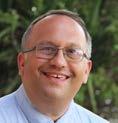
It is taught in the name of the Baal Shem Tov zy’a, that we subsist on the sustenance that Hashem provides us in his great kindness. “And what does Hashem ‘subsist’ on? the Baal Shem Tov asked. “Upon the praises of Israel!”
When one Jew asks another how things are going and his fellow responds by praising and thanking the Ribono Shel Olam, through acknowledging Hashem, they are deepening Hakadosh Baruch Hu’s involvement with all of creation.
In our sedra this week, we are introduced to a phrase that is a familiar refrain for so many of us.
The Torah tells us:
“And Yitro said-Baruch Hashem-Blessed is Hashem,who delivered you from the Egyptians and from Paroh, and who delivered the people from under the hand of the Egyptians...”
Rabbi Baruch HaLevi Epstein zt’l in his commentary on the Chumash,Torah Temima, points to the Gemara in Brachot (54a) which teaches us:
סנה לע ךרבל םיבייחש ןאכמ - From here (this statement of Baruch Hashem, made by Yitro) we learn that one is required to recite
a blessing and acknowledge a miracle.
The Gemara in Sanhedrin (94a), points out something interesting related to this verse as well:
“It was taught in the name of Rebbi Papeyas: It is an embarrassment for Moshe and the six hundred thousand adult men of the children of Israel whom he led out of Egypt that they did not acknowledge or bless Hashem, until Yitro came and said: “Baruch Hashem.”
The Tiferet Shlomo, the Rebbe of Radomsk zy’a, asks regarding these two maamarei Chazal:
How exactly are we to understand this? Surely Klal Yisrael uttered thousands of expressions of thanks to Hashem following their departure from Egypt, indeed they sang out with songs of praise as the sea split beneath them. However, Yitro praises and thanks Hashem for the miracles that were done on behalf of Bnai Yisrael, not miracles he himself experienced or witnessed.-Baruch Hashem asher Hitzil etchem-Blessed is Hashem who delivered you!!!
Yitro teaches us a very important principle, says the Rebbe of Radomsk. It is one thing to acknowledge and praise and thank Hakadosh Baruch Hu, when we ourselves experience miracles, and receive divine chesed and compassion, but it is an entirely different and higher spiritual plain, to be able to express our praise and thanks to Hashem, when he bestows kindness upon others.
50 TORAH TIDBITS 1504 / YITRO 5783
דַּיִמּו םִיַרְצִמ ד ַּיִמ םֶכְתֶא לי ִּצִה ר ֶׁשֲא ’ה ְךּו רָּב ֹורְתִי רֶמאֹּיַו םִיָֽרְצִמ־דַי תַחַּתִמ ם ָעָה־תֶא ליִּצִה רֶׁשֲא ה ֹעְרַּפ
Yehi Ratzon, may we each merit to heed this beautiful teaching from the Tiferet Shlomo zy’a, and always find the capacity to not only empathize and feel connected to one another, but also merit to realize and acknowledge Hashem’s chesed which is present all around us, in our own lives and in the lives of our neighbors.



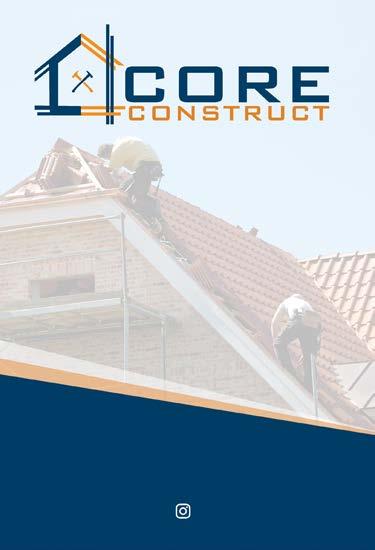

OU ISRAEL CENTER 51
BY RABBI MOSHE TARAGIN R am, Yeshivat Har Etzion
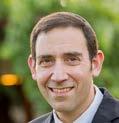
Wings of Eagles
In the leadup to Har Sinai, Hashem painted a vivid picture of our splendid future - should we accept his offer of Torah. We would be His “treasure” or his הלוגס םע, cherished and protected. Additionally, we would serve history as a coalition of priests or a םינהכ תכלממ, while also showcasing the dignity of a commanded life as a שודק יוג. Our future as the people of G-d held great promise and great opportunity.
Hashem invoked a third image as part of this glorious forecast: We would be transported upon the wings of eagles םכתא אשאו ילא םכתא איבאו םירשנ יפנכ לע. Wandering through a parched and waterless desert, the option of being hoisted upon eagles was very enticing. Eagles soar higher than any other bird, protecting their young by hauling them on their backs, out of harm’s way. After centuries of persecution and defenselessness, this offer of safety and protection was comforting.
Soaring on eagles also provided the benefit of rapid travel. Facing the daunting prospect of voyaging through a hot and scorched desert, we gladly welcomed the notion of quick air travel. Being carried to
the Promised Land on winged carriers was preferable to tugging our clumsy donkeys through unending desert dunes. The metaphor of eagle transport offered an enticing travel solution, which according to Chazal we had already experienced, earlier in our journey. In the immediate aftermath of Yetziat Mitzrayim, millions of scattered slaves quickly assembled in the Egyptian city of Ramses and, in one day, miraculously traveled over 500 km to an encampment named Sukkot. Supernaturally rapid travel was already familiar to us from the first day after our liberation.
Finally, the promise of eagle travel also invited us to a heavenly encounter with Hashem
ילא םכתא איבאו. For the first 2500 years of history Hashem seemed very distant from Man. His ways were mysterious and His essence unfathomable. Humanity suffered what seemed to be endless divine punishments, making Hashem feel even more indecipherable. The ten plagues, most of which originated in heaven, did little to change that image of a fearsome and distant G-d.
Before Har Sinai could commence that distance had to be bridged. The flight upon eagle’s wings was a divine invitation to a heavenly rendezvous. Interestingly, after accepting Hashem’s offer of a meeting in heaven, we were treated instead, to a
52 TORAH TIDBITS 1504 / YITRO 5783 GEULAS YISRAEL
terrestrial encounter. On the great day of Matan Torah, Hashem descended into our world , and met us upon a desert mountain. The long-awaited meeting didn’t take place upon eagle’s wings, but upon a mountain summit.
Competing Eagles
Sadly, the gyrations of Jewish history tarnished this radiant image of soaring eagles. In chapter 17, Yechezkeil portrays the scheming of a weak and fickle nation, during the waning days of the first Mikdash. Our nation was caught in the middle of a territorial rivalry between a stronger and a weaker eagle. Nevuchadnezar of Bavel had already exiled the Jewish aristocracy, but had spared the Mikdash and had appointed a Jewish monarch named Tzidkiyahu as a puppet ruler. Had we remained loyal to our commitments to Babylonia, we would have retained our sovereignty and preserved our Mikdash. Instead, we rebelled, looking to a weaker Egyptian eagle for assistance. Ultimately, our flirtation with this Egyptian eagle riled the stronger eagle of Babylonia to invade our country, ransack the Mikdash, and to evict the remaining Jews from Israel.
We had been promised a ride upon a divine eagle, but now we were reduced to pinballing between two inconsequential eagles. We had no business with either of these two human eagles, but our religious malfunction subjected us to these petty political rivalries. A lustrous vision had degenerated into a disgraceful political maneuver. Our religious betrayals poured graffiti upon Hashem’s original vision.
Eagle Invasion
Hundreds of years later, a solitary and

OU ISRAEL CENTER 53
overpowering eagle would invade our Land and reshape Jewish history. The second tochacha of parshat Ki Tavo is a literary gloss or allegory for the Roman invasion of our Land and the eventual destruction of the second Mikdash. This nightmarish passage describes armies invading Israel from distant lands, in a manner similar to eagles which land from faraway locales:
. Making matters worse, these attackers spoke an unfamiliar language. We were familiar with Babylonian language and culture, but had never encountered these strange Roman warriors who appeared out of nowhere, landing on our shores by the tens of thousands, and speaking an alien language.
Imagine the terror of watching this fierce army, bearing frightening new super weapons, whose language we could barely understand. I often imagine Western European Jews disembarking to death camps after days-long journeys in crammed cattle cars. As they arrived, breathing their first fresh air in days, they were barked at in German and Ukrainian. The fear and confusion must have been paralyzing as it was to the Jews first encountering the Roman legions. History was repeating itself, as it always does.
The Romans, who had landed from afar like eagles, adopted the aquila, or the Roman eagle as the symbol of their imperial and invincible army. Invading and plundering Israel, they perverted our eagle image into a symbol of Jewish suffering. The radiant eagle symbol of Jewish selection had now turned sinister. Such is the terrifying consequence of Jewish betrayal,
that we turn blessings into curses.
A Murderous Eagle
Close to two thousand years later we would, once again, watch as this symbol of Jewish pride was weaponized against our people. The Third Reich launched its genocidal plan under the emblem of a ferocious and predatory eagle bearing sharp talons, which would tear European Jewry asunder. Once again, Hashem’s redemptive image of kanfei nesharim was perverted from a badge of Jewish pride into an icon of Jewish suffering. History was repeating itself, as it always does. We had been grounded for two thousand years, and our eagle dream had become an eagle nightmare.
The Friendly Skies
A few short years after the Holocaust, Jewish history was rejuvenated, and our eagle symbol was reconstituted. Though the state of Israel is fundamentally secular, it still possesses a deep historical sensitivity and strongly identifies with Tanach as the source of Jewish history and heritage. For this reason, many Israeli military exercises are named after Biblical phrases.
In the late 1940s the ancient Yemenite Jewish community found itself in grave danger. In a series of daring airlifts, close to 50,000 Yemenite Jews were transported to Israel in an operation dubbed “Wings of Eagles” (though it was also referred to as Magic Carpet). This bold rescue restored part of the luster of Hashem’s original invitation. Hashem’s promise was now being partially fulfilled, as Jews were being miraculously transported home upon wings of eagles. Of course, these modern eagles were crafted from aluminum and powered by jet fuel. As history was being
54 TORAH TIDBITS 1504 / YITRO 5783
הֶאְדִי ר ֶׁשֲאַּכ ץֶר ָאָה ה ֵצְקִמ קֹחָרֵמ יֹוּג ָךי ֶלָע קָוֹקְי אָּׂשִי ֹוֽנֹׁשְל עַמְׁשִת־אֹל ר ֶׁשֲא יֹו ּג רֶׁש ָּנַה
reformatted, an ancient divine promise, which had been notoriously vandalized, was, once again beckoning Jews to Israel. The rebirth of the State of Israel reinstates past glories and past promises.


Air Travel
In an overall sense, beyond the airlifting of Yemenite Jews, our redemption is being served by these modern wings of eagles which we call air travel. The emergence of air travel has radically altered the pace of our resettlement of Israel. In the past, travel to Israel took months and even years, as we arrived by foot or, if lucky, by ship. These crude forms of travel made mass Aliyah almost inconceivable. It was impossible to generate a large enough mass of returning Jews to create a stable and sustainable Jewish population. Jews arrived in drips and drabs, never creating a viable autonomous and enduring presence.
Travel with Confidence

1UniTravel - Medical Insurance at great prices Choose from multiple options 1unitravel.brokersnexus.com



1UniSim - Sims for USA and Worldwide Starting at $40 sales@1unisim.com Call 077-400-3199 or USA 718-715-0001


Air travel changed all that and there are few images more iconic to modern Aliyah than Jews arriving on El Al airplanes kissing the ground upon arrival. We are returning on wings of eagles and our return has reclaimed that long tarnished image.
The soaring eagle of Jewish history is airborne once again. The eagle has landed.. in Israel.



Great Investment! 2 rooms, mirpeset & underground parking in new building under construction in a great location. Starting at 1.89m NIS/ 3 & 4 rooms also available.
Baka very close to Emek Refaim, 4 rooms, 82m in a tama 38 building. Elevator, mirpest & storage. Will be ready in 4 months. Amazing price of 2.99m shekel
For rent in Old Katamon - 4 rooms, renovated, ground floor, high ceilings, small garden, parking. 9000 shekel per month
OU ISRAEL CENTER 55
Soon?
Flying
NACHI REALTY 054-461-3943
Shabbat
Miss It!
DOROT RISHONIM, JERUSALEM
all hats Saturday NightFever!
Motzei
February 11 Between 20:00-22:00 Don’t
3
20%OFF
REBBETZIN DR. ADINA SHMIDMAN




Holy, Holy, Holy...words that we recite daily, before Shema, during Kedusha, in Uva L’Tzion, sitting, standing, in Hebrew and in Aramaic. What exactly are we expressing as we repeat these words, “Holy, Holy, Holy”? Does holy carry the same meaning for us as it does for Hashem? For people, holiness is being able to distinguish - to separate - good from bad, exalted from mundane, right from wrong and apply those distinctions to one’s behavior.
But G-d’s holiness is different - the Malbim suggests that G-d’s holiness displays itself in three realms, hence the word “Kadosh” is said three times. G-d is separated from earth as He is not made of matter, He is separated from Heaven as He has no form and He is separated from time as He is eternal. Rav Dovid Tzvi Hoffman, (1843 –1921) highlights the difference between G-d’s holiness and Man’s by noting that the word “Kadosh” is spelled incomplete ׁש דָק when it refers to humans while it is spelled full, ׁשֹו דָק when it refers to Hashem. Only Hashem’s holiness is complete. Our task in this world is to strive toward Hashem’s holiness - while recognizing that we
live in a physical world. We are charged
- be holy because I am Holy. The commandments that follow are Shabbos and honoring our parents. In our interpersonal and spiritual spheres, we have the capacity to bring Hashem’s holiness into our physical world and live inspired lives.

56 TORAH TIDBITS 1504 / YITRO 5783
...ׁשֹודָק ׁשֹודָק ׀ ׁשֹודָק רַמָאְו הֶז־לֶא הֶז א ָרָקְו
ׁשֹו דָק יִּכ ּו יְהִּת םיִׁשֹדְק
Rebbetzin Dr. Adina Shmidman is the founding director of the Orthodox Union Women’s Initiative and the rebbetzin of the Lower Merion Synagogue in Bala Cynwyd, PA.





OU ISRAEL CENTER 57 For addi�onal informa�on or to schedule your UltraClear TM Consulta�on with Dr. David Friedman: 03-612-2322 /02-563-5673 / + 972-58-563-5673 www.ultraclearlaser.com www.drdavidfriedman.co.il Dr. David Friedman is Proud to be the First Doctor in Israel with the Groundbreaking FDA Approved UltraClear TM Laser for Younger-Looking Skin with Less Pain and Downtime Can Complement your Filler & Botox UltraClear TM helps reverse signs of aging: Skin Tone & Texture, Fine Lines, Sun & Age Spots, Deep Wrinkles, Scars and Acne Scars TM
Editor, Torah Tidbits
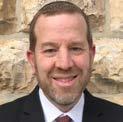
The Neshama of the Nation
The first-fruits symbolize the special love the nation has for agriculture - for its Israelite civilization will develop only when the people are isolated and impervious to gentile influence, and the power of unity is perfected through the spiritual, at which it excels (Eretz Chefetz 3:7)
Rav Kook, in the above passage, comments on the profound meaning behind bringing the Bikkurim and its broader symbolic implications.
However, even before analyzing Rav Kook’s comments, it is fitting to quote the Ohr Hachaim’s insight at the opening of parshat Ki Tavo, where the Torah delineates the mitzvah of Bikkurim:
‘“It will be when you come, etc.”: The Torah introduces this paragraph with the word ve’haya, indicating a joyous event; the message is that the only true reason for being joyful is when one is privileged to live in the Holy Land. Take note of what King David had to say about the return to Zion, i.e. (Tehillim 126:2) ‘then our mouths will be filled with laughter.”’
Rav Kook shares an insight on the mishna in Bikkurim which details the ceremony of bringing up the first-fruits to the Beit Hamikdash:
A society of farmers is often an insular society, as opposed to a society of merchants which by its very nature must be open. The fact that the Israelite economy was agriculture based, Rav Kook views as divinely instigated to preserve the insular character of the Jewish people. What results is that the People of God will develop its own internal gifts rather than be inundated by foreign influences.
Thus the ceremony of Bikkurim (firstfruits) is a celebration of nature. For this reason, the pilgrims would sleep out of doors rather than inside the home. (See ‘Of Societies Perfect and Imperfect,’ Naor, p.1)
It is noteworthy that towards the end of Parshat Ki Tavo, in the section of the Torah that contains the laws of Bikkurim, we find a verse stating the punishments that will come to the nation as a result of not serving God b’simcha u’ve’tov levav, ‘in joy and goodness of heart.’
Rav Kook comments on the apparent redundancy: simcha and tov levav. He explains that they are very different. Simcha (joy) he says relates to receiving something that is beyond one’s expectations - perhaps receiving something that one is unworthy to have acquired. Tov levav, is the feeling one has knowing that one is up to the challenge. “I have received these gifts because the other sees my true potential and believes in my abilities” (Mussar Avicha, #8).
58 TORAH TIDBITS 1504 / YITRO 5783
RABBI AARON GOLDSCHEIDER
The Jewish people are joyous knowing that they have received the Torah, mitzvot and a singular way of living. But, above and beyond the joy of receiving these gifts, there is a ‘heartfelt contentment’ knowing that they are worthy of achieving greatness and nobility.
Rav Kook emphasizes that there are singular qualities which are organic, embedded in the character of the nation of Israel. There is no need to look elsewhere for an ethical charter or for values. In a word, Rav Kook asserts that the Jewish people’s collective neshama, unlike any other nation on earth, is marked by an especially strong yearning for Godliness.
Rav Kook in his commentary on the mishna in Bikkurim above is emphasizing that there are singular qualities which are organic, embedded in the character of the nation of Israel. There is no need to look elsewhere for our ethical charter or for values.
In a memorable comment on the Haggadah, Rav Kook offers a unique perspective which emphasizes this idea. One of the themes surrounding the Pesach story is ‘haste.’ The paschal lamb must be eaten in haste (Shemot 12:11). The Jewish people had no time to make provisions for the way, they left in haste (Shemot 12:39). The matzah itself prepared for Pesach must be made quickly, under 18 minutes. This leads to the question, why in fact is the element of speed so significant?

Many answers have been offered. The Maharal (Gevorot Hashem 36), for example, explained that the haste is an indication that the redemption from Egypt was a miraculous event. An event that passes
Beit Knesset Hanassi
quickly and skips gradual phases testifies to a miraculous redemption.

Rav Kook interprets the concept of haste differently. Usually, each nation develops according to its natural order. A nation builds its culture gradually and slowly achieves material and spiritual growth. But the Israelites’ great power of growth was dormant in Egypt, vanquished by poverty and material and spiritual baseness. If God were to have freed them gradually, they would have constructed their new culture on an edifice of Egyptian mores. Since this was unacceptable to God, “He brought them out suddenly…so that they were transformed in one moment from base slaves into a nation of divine culture and great values. (Olat Re’iya, vol. 2, p. 287)
Thus, Rav Kook concludes, haste was imperative so that the Israelites would
OU ISRAEL CENTER 59
077-2050015
052-2678749
golanechasim@gmail.com
Meir Golan

BAKA: 4 room apartment, 82m, storage, elevator, needs renovation 2,950,000NIS
KATAMON: new project, 2-3 room apartments, starting from 1,750,000NIS

4-5 room apartments starting from 3,200,000NIS
All apartments are fully accessible with parking and storage
RECHAVIA: 4-room apartment, 92m, Sukka balcony, Shabbat elevator, fully accessible, private parking, storage 4,400,000NIS
BAKA: 5-room garden apartment, 140m, master suite, private parking, storage, full of light and airy, nice garden, 5,250,000NIS
OLD KATAMON: Spacious new 5-room penthouse, 155m, terrace overlooking a great panoramic view, underfloor heating, full of light, Shabat elevator, 2 parking spots, rental unit, asking price 9,000,000NIS
THE GREEK COLONY: charming 3-room apartment on "Dmei Mafteach" (tenancy protected for life) full of light and good energy, 74m, high ceilings, balcony, 1,400,000 NIS
never experience a moment as a free people under the influence of a foreign culture. Instead, as soon as they would be freed, they would leave and then be redeemed. As long as they remained slaves, there was no fear of their learning from and admiring the culture of their oppressors. But the moment they were free, they would be at risk of absorbing Egyptian culture, even in a short period of time. If this were to occur before they formed their own spiritual character, the foreign spirit would have penetrated their souls before they tasted the Torah. Therefore, God rushed to take them out the moment he freed them, and did not allow them to tarry in Egypt for even a short time, lest they become corrupted. God wanted the spiritual character of the freed slave to be determined on their own terms.
Parshat Yitro from Rav Kook: Set in Stone
It may be the most recognized image from our Torah: the stone tablets upon which the Ten Commandments are inscribed. The Torah makes a special point of calling them luchot ha-even, the “stone tablets” (Exodus 24:12).
Rav Kook asked why God chose to write the Ten Commandments on stone tablets? He answered it in this way:
God writes The Ten Commandments on stone, which represent the entire Torah, as a symbol that these teachings are “etched in stone,” and therefore never to be replaced. There may be
those throughout our history who suggest that only the spirit of the Torah is lasting but not the actual laws and detailed rituals. Not so, says Rav Kook. Stone is a substance that withstands time and is impervious to the harsh winds and changing conditions that it may encounter.
Rav Kook cites the Midrash (Tanhuma Ki Tisa 29) which says that the tablets were made from precious sapphire –among the most firm and solid of all stones. The stone tablets represent the timelessness of the Torah and the eternal nature of its commandments.
60 TORAH TIDBITS 1504 / YITRO 5783
Meir Golan Old Katamon: 4-room apartment in a small and quiet street, 101 sqm, renovated, very bright and airy, master bedroom, Safe room (mamad), sukkah balcony, view, elevator, 3,400,000 NIS Old Katamon: 4-room apartment, 90 sqm, well split, bright airy, sukkah balcony facing a magnificent panoramic view, 3 exp Shabbat elevator, parking, 3,290,000 NIS Old Katamon: Spacious 3-room apartment in a very quiet street, 75 sqm, sukkah balcony facing a green and pastoral view, 3 exp. Shabbat elevator, private parking, storeroom, 2,690,000 NIS





OU ISRAEL CENTER 61 Nahum Glatzer 050-7225694 gilinskirealestate@gmail.com Gilinski Real Estate Your realtor in Jerusalem Frustrated?? Let me know what property you are looking for – and I will find it for you!
Putting on Tallit and Tefillin in Early Morning
Question: During certain times of the year, I have to daven significantly before sunrise. What should I do about putting on tallit and tefillin (=t & t), as I start davening before the time for those mitzvot?

Answer: The starting time for Kri’at Shema (Orach Chayim 58), tzitizit/tallit (OC 18), and tefillin (OC 30), is called misheyakir (the time it is light enough to recognize certain things). There are many opinions as to how long before sunrise this is. The extreme opinions are as little as 30 and as much as 60+ minutes before sunrise; the most common opinions range from 40 to 50 minutes before. Because light depends on the angle of the sun under the horizon, many posit that latitude and season affect this time. Therefore, people need to rely on local calendars or some website, which will not represent unanimous truths (most of such resources are close to the general consensus).
RAV DANIEL MANN

Kri’at Shema starts at misheyakir apparently because this is when serious numbers of people start getting up (see Magen Avraham 58:6). Regarding tzitzit, the gemara (Menachot 43a) exempts “night clothing” from tzitzit because the Torah describes seeing the tzitzit. There are two pertinent machlokot on this matter. According to the Rambam (Tzitzit 3:7-8), the exemption refers to the time of the day, and it begins at misheyakir, which relates to the ability to see. Some (Rosh, Tzitzit 1) say that daytime clothing is obligated in tzitzit even at night, and others (Mordechai, Megilla 801) say that the starting time is alot hashachar (at least 72 minutes before sunrise). Because we view the first question as a safek, we wear tzitzit at night but without a beracha (Shulchan Aruch, OC 18:1), and while the Rama (OC 18:3) allows making a beracha from alot hashachar, this is not broadly accepted (see Mishna Berura 18:10).
Most Rishonim (see Beit Yosef, OC 30; the Rambam, Tefillin 4:10 is an exception) posit that the mitzva of tefillin applies at night, fundamentally. However, we must not put on tefillin at night (even without a beracha) out of a concern we may fall asleep and release gas with them on (Rashi, Menachot 36b). One who has already woken up and needs to put them on may do so early, in which case, when the time comes (misheyakir – Shulchan Aruch, OC 30:1), he handles the tefillin and then makes the beracha
62 TORAH TIDBITS 1504 / YITRO 5783
FROM THE VIRTUAL DESK OF THE OU VEBBE REBBE
תמשנ יוליעל ל"ז ןמצלז לאיזוע םהרבא ןב םירפא לאוי
The Orthodox Union - via its website - fields questions of all types in areas of kashrut, Jewish law and values. Some of them are answered by Eretz Hemdah, the Institute for Advanced Jewish Studies, Jerusalem, headed by Rav Yosef Carmel and Rav Moshe Ehrenreich, founded by HaRav Shaul Yisraeli zt”l, to prepare rabbanim and dayanim to serve the National Religious community in Israel and abroad. Ask the Rabbi is a joint venture of the OU, Yerushalayim Network, Eretz Hemdah... and OU Israel’s Torah Tidbits. (Menachot 36a). We also find the idea of handling before the beracha regarding tzitzit that were put on early (Rama, OC 18:3).


There are two valid options: to wait to put on the t & t until their time comes or to put them both on at the regular juncture and make the beracha later (Mishna Berura 89:40), and the point to do it is between Yishtabach and Kaddish, not during P’sukei D’zimra (Rama, OC 54:3). If misheyakir comes before Baruch She’amar, which is more likely if one decides to use (this time of year) the order of Nusach Sephard, that is optimal. How many opinions one should satisfy and what to do about a safek whether misheyakir has come is debatable (see Piskei Teshuvot 30:(4)).

The halachic differences between waiting to put on and waiting for the beracha are small. Assuming misheyakir comes before Barchu (or there are other problems – see Shulchan Aruch, OC 58:3 and Mishna Berura ad loc. 17), the point to put them on
and/or make the berachot is between Yishtabach and Kaddish. The main problem at that time, hefsek, relates to speaking, and either way the berachot are said then. There is only a slight advantage of having t & t on early in tefilla, and it is not much of a problem to have them on before their berachot for a good reason (see Shulchan Aruch, OC 8:10).
Let us examine practicalities. For one davening at home, a deciding factor might be which system is more likely to cause a mistake – forgetting to make the beracha at all or forgetting to put on t & t at the right time (if he remembered later, see Shulchan Aruch, OC 66:2). In a shul, friends’ actions may remind others. The rabbi has to decide whether to seek uniformity or have everyone decide for himself. If the former, there are various considerations to weigh.
OU ISRAEL CENTER 63 Having a dispute? For a Din Torah in English or Hebrew contact ‘Eretz Hemdah - Gazit’ Rabbinical Court: 077215-8-215 • fax: (02) 537-9626 beitdin@eretzhemdah.org
MASSAGE THERAPIST & FITNESS TRAINER 052.673.3704 I www.andyhealth.com | jerusalemmyhome@hotmail.com TUVIA ANDY HAAS BALANCE and FALL-PREVENTION SPECIALIST for OLDER ADULTS Maintain Healthy Bones and Muscles Decrease Stiffness and Joint Pain Increase Strength! Stay Independent!
BY RABBI MOSHE BLOOM en.toraland.org.il




Post Tu Bishevat 5783: What Is The Significance Of This Date For Ma’aserot This Year?
Last week, we discussed the significance of 15 Shevat (Tu Bishevat) for orlah and neta revay. We noted that for fruit to be permissible to eat after the tree’s orlah years are over, the fruit needs to begin to develop (chanatah) after 15 Shevat following the Rosh Hashanah of that year.

What about terumot and ma’aserot?
During regular years, fruits that reach the chanatah stage before 15 Shevat belong to the previous year, while fruits that develop after 15 Shevat belong to the new ma’aser year, the current year. Because of this, before 15 Shevat every year it is important to check lemon trees and either harvest or mark the lemons before this time.
However, because last year was a shemitah year, it changes the rules of the game. This year, fruits that began to develop before Rosh Hashanah 5783 belong to shemitah and all shemitah laws (including their exemption from terumot and ma’aserot) apply to them. Fruits that develop after Rosh Hashanah belong to this year, the first year of the shemitah cycle, which is a ma’aser sheni year. Note that vegetables harvested after Rosh Hashanah this year all belong

to the first year as well and are subject to ma’aser sheni.

At this point in the year, all ripe or nearly ripe lemons belong to shemitah. This is because the period between the beginning of development and ripening for lemons is 6-10 months. For dwarf lemons, though, this time is shorter. It is possible that there are already ripe dwarf lemons that began to develop this year.
Note: While this is most relevant to lemon trees, this issue also applies to almond, peach, and loquat trees during regular years since fruit can begin to develop on these trees before Tu Bishevat time. This year, however, it is not relevant since Tu Bishevat
64 TORAH TIDBITS 1504 / YITRO 5783 TORAH VEHA'ARETZ INSTITUTE
Pesach In Yavniel! All Year-round From Couples to Groups of 40+ Opposite Shul/Mikeveh 12 Minute Drive to the Kinneret VILLA RIMONA YAVNIEL 058 400-5545 - www.villarimona.com
Villarimona@gmail.com
Villa and Tzimmers
OU ISRAEL CENTER 65 FACILITATE • CELEBRATE • ADVOCATE • EDUCATE ISRAEL JOB BOARD ISRAEL JOB BOARD ISRAEL JOB BOARD POWERED BY: NEFESH B'NEFESH ISRAEL JOB BOARD POWERED BY: NEFESH B'NEFESH ISRAEL JOB BOARD ISRAEL JOB BOARD ISRAEL JOB BOARD ISRAEL JOB BOARD POWERED BY: NEFESH B'NEFESH ISRAEL JOB BOARD POWERED BY: NEFESH B'NEFESH ISRAEL JOB BOARD ISRAEL JOB BOARD ISRAEL JOB BOARD ISRAEL JOB BOARD POWERED BY: NEFESH B'NEFESH ISRAEL JOB BOARD POWERED BY: NEFESH B'NEFESH ISRAEL JOB BOARD ISRAEL JOB BOARD ISRAEL JOB BOARD ISRAEL JOB BOARD POWERED BY: NEFESH B'NEFESH ISRAEL JOB BOARD POWERED BY: NEFESH B'NEFESH ISRAEL JOB BOARD Do you know a North American medical professional considering Aliyah? Let them know about MedEx! MedEx is NBN’s can’t-miss event for anyone who dreams of moving to Israel and practicing medicine. www.nbn.org.il/aliyah-medex-2023 For more information: www.nbn.org.il
BY SIVAN RAHAV-MEIR
Freedom
“Are we enslaved?” asks Rabbi Nir Menussi. “We all assume that, long ago, we went from slavery to freedom. The story of the Exodus from Egypt has convinced most people that they are free. Yet we are still enslaved; we are slaves to freedom. Here a paradox is created: In making freedom our supreme value, we have become enslaved to it.
The most important command in today’s culture is: ‘Don’t miss out.’ We are obligated to exploit every opportunity for adventure and personal pleasure. Accumulate experiences, try everything once. But there are so many possibilities that it’s impossible to do it all. Try to choose cheese or shampoo at the supermarket and you discover that there are 20 options. And what about choosing a profession? Or a spouse? With so many options, we may become confused or frustrated and, even after we have chosen, we may continue to compare our choice to that of others, never
certain that we made the right choice.
It’s not pleasant to admit that ultimately we must limit our freedom and our choices. When the possibility of making choices is taken away, we are not free. But when we have too many choices, that can also be paralyzing.
The consequence of all this is that whoever wants to travel everywhere, to eat every food, and drink every type of alcohol, will never experience anything authentic, since authenticity depends on focus. To focus on my family, my home, my life. It may seem to me that I experience everything, yet I really have done nothing when I lack the devotion required to experience anything deeply. This is the result slavery in its modern form.
Freedom is an important value, but it needs to be our servant and not our master. Freedom is necessary in order to actualize other values. The most rewarding path in life is taken when I know my purpose, what I must do in this world, and how freedom serves this purpose. And so I can go from limitless to authentic freedom.”
Sivan Rahav-Meir is a media personality and lecturer. Married to Yedidya, the mother of five. Lives in Jerusalem, and formerly served as the World Mizrachi Shlicha to North America. Sivan lectures in Israel and overseas about the media, Judaism, Zionism and new media. She was voted by Globes newspaper as most popular female media personality in Israel and by the Jerusalem Post as one of the 50 most influential Jews in the world.
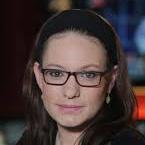
66 TORAH TIDBITS 1504 / YITRO 5783
THE DAILY PORTION
Please note the updated mailing address for the OU Israel Center: OU Israel 22 Keren Hayesod POBox 1441 Jerusalem 9101302


































Science, M’Rabanan A weekly shiur Sundays at 10 a.m. Discover the revolutionary program taking the world by storm: a concise learning method, from the Talmudic source through modern-day halachic application, with a focus on practical Halacha. No prior knowledge necessary. In person and on Zoom. Both shiurim are being given by Rabbi Joel Kenigsberg. All are welcome and there is no charge. Go to bkhanassi.com for Zoom links Tzurba Technology Halacha & Beit Knesset Hanassi Young Israel of Rehavia 24 Ussishkin Street Jerusalem A 5-part series Wednesdays at 8 p.m. begins January 18th What does the Torah have to say about lab-grown meat, self-driving cars, artificial intelligence and other novel technological breakthroughs? In person and on Zoom. 054-527-9356 DIRTY AIR, DAMP & MOLD GREEN TREATMENT EXPERTS - Corona Cleaning - Deodorization - Leak Detection Systems - Waterproofing - English + Hebrew Reports - Working at heights - Insured - Quality House Painting QUICK ESTIMATE/FREE ADVICE :)
Practical Conclusions
Last time we saw that in the case of baby Sofia, who was born to a couple who are not her genetic parents, we are not halachically obligated to search for the couple who gave the genetic material.
So what should happen to the baby?
Rabbi Aryeh Katz, a colleague of mine at PUAH and a respected Dayan in Jerusalem, developed a halachic principle that he called the Principle of Simplicity. The basic idea is that if a child is born to a woman the simple understanding is that she is the mother. The halacha follows a certain logic and in cases of doubt we are bound by the simplistic comprehension of the situation. This principle would dictate that in Sofia’s case, since we do not know who the genetic parents are, we can view the woman who carried her and gave birth to her as her mother.

The Shulchan Aruch (Even Haezer 82:7) writes that in the case of divorce small children should be raised by the mother. When the children are a little older, around the age of six, then the boys should be with the father and the girls with the mother. The rationale for this is that the daughters have a greater need for a mother figure and the boys will benefit from growing up in the
presence of their father.
Rabbi Meir Katzenellenboggen, known at the Maharam Padua since he was the Rabbi of the city of Padua from 1525 until his death in 1565, was one of the important poskim in the 16th century. He wrote that this principle is not employed in every case. If the Beit Din see that in a specific circumstance it would be better for the boys to be with their mother, or the girls with their father, that is how the Beit Din will decide.
Rabbi Moshe Isserlis, quotes the Maharam Padua, in his gloss on Even Haezer, and suggests that this is the halacha and should be followed.
From here we see an important concept, that we would today refer to as the best interests of the child. The Beit Din does not render decisions based solely on the laws recorded in the Shulchan Aruch, but they must assess the situation and ascertain what is the best interest for the child involved.
In Sofia’s case, the best decision may be to leave her with the birth mother who will raise her as her own.
Most on this next time.
The Puah Institute is based in Jerusalem and helps couples from all over the world who are experiencing fertility problems. Offices in Jerusalem, New York, Los Angeles & Paris. Contact (Isr) 02-651-5050 (US) 718-336-0603 www.puahonline.org
68 TORAH TIDBITS 1504 / YITRO 5783
RABBI GIDEON WEITZMAN
Machon Puah for Fertility and Gynecology in Accordance with Halacha

OU ISRAEL CENTER 69

70 TORAH TIDBITS 1504 / YITRO 5783

OU ISRAEL CENTER 71
DR. JACOB SOLOMON FROM THE SCHOOL OF THE RAMCHAL
 BY JACOB SOLOMON Contributer, Torah Tidbits
BY JACOB SOLOMON Contributer, Torah Tidbits
From The Ha’amek Davar
“You shall understand that G-d chastises you as a father chastises his son.” (8:5)
In advising Moshe to delegate suitable people to deal with the routine disputes that occur among the Israelites instead of all being on Moshe’ shoulders, Yitro concludes with:
If you do this… you will be able to bear the strain, and all the people will go back to their place in peace (18:23).
The Ramban explains that in bringing up a child, the father looks to the child’s growth and future. Not spoiling them, but using firmness and even hardships on occasion, to prepare them for living as a responsible adult. To be able to deal with situations, and appreciate good rather than take it for granted. G-d did the same to the Israelites: He made them endure the hardships of living in the wilderness so that they may appreciate the resources, wealth, and pleasure of settling and living in the Land.
Yitro, Moshe’ father in law, had just joined Moshe in the process of leading Am Yisrael towards the Promised Land. As a new arrival to the already establishing routines, he saw things with the wide angle of the wise and informed outsider. He observed that Moshe needed to establish a hierarchy of worthy judges, who would enable him to have the strength to focus on the essentials.
quickly get to the bottom of the lawsuit, apply the law, and issue a ruling. The loser of the dispute would not “go back to his place in peace”, but instead, go home feeling aggrieved and hostile towards the law in general and Moshe in particular. Those who are wrong don’t like losing. Such is human nature.
the need for correction, the more severe the trial (though the truly wicked receive the reward for their few good deeds in this world, as G-d knows that they do not respond to correction).
The Harchev Davar (extension of the Ha’amek Davar) gives an insight into the wisdom of Yitro’s advice. Disputes would, in fact, be better resolved without Moshe’ involvement. For the following reason. Moshe knew both the people and the law (din) too well. For that reason, he would
In addition, G-d’s being close to the individuals of Klal Yisrael as a father is to a son implies hasgacha peratit: that the trials that G-d imposes on individuals are for that person’s benefit, as a concerned father chastises his son. Indeed, the Ramchal (Derech Hashem: Providence 3) explains that part of hashgacha peratit are the trials one suffers, which are generally G-d-sent opportunities for spiritual growth. These experiences are designed to be specifically in line with the areas that the individual needs to improve on, as a father who wishes to promote the child’s growth. G-d’s trials to individuals may be in the form of wealth or in the form of suffering. Generally, the greater
In addition, suffering for the righteous is very often a means of encouraging them to reach even greater heights, though it can be that they are bearing the misdeeds of a generation, or their afflictions fulfill a yetnot-understood niche in the wider eternal scheme of the Creation, or those people have reincarnated souls whose pain is in line with their conduct in previous lives. The Ramchal explains that though it seems that a righteous person’s torments in this world are out of line with his exemplary good conduct, all is redressed in the next world, where a person’s treatment is in strictly in line with his deeds and his true circumstances that are known only to G-d. In all these cases, G-d acts as a father concerned with his children: giving them what is needed now with an eye to their long term physical and spiritual future.
In contrast, those with less judicial experience than Moshe would use their position at the outset to persuade the litigants to come to a compromise (peshara), and to agree to a mediated settlement (c.f. Sanhedrin 6b). The law would not be compromised, yet all involved would be able to save face and “go back to their place in peace” feeling that the matter has been amicably resolved, or that at least that they had done reasonably well in the circumstances. In contrast, Moshe would not have that option. With his knowledge of both the law and the ways of the Israelites, his getting to the root of the matter and applying the law would be undermined if he then abandoned strict justice and followed the line of equity. Thus Yitro’s proposal of delegated justice would be for both the good of Moshe, and for the good of the people.
However, and looking forward, the system did not appear to have been an unqualified success. Moshe sought people who had “wisdom, understanding, and were well-known to their tribes” (Devarim
This level of hashgacha peratit, the Ramchal explains (Derech Hashem: Providence 4), is a privilege to Klal Yisrael. Their experience of willingly participating in the Revelation at Mount Sinai gave them the capacity to accept the Torah and its demands: “Moshe brought the people to meet G-d, and they positioned themselves
72 TORAH TIDBITS 1504 / YITRO 5783
GUEST WRITER המלש האופר האל היח ןב םייח עשוהי
1:12), yet he found himself lowering the entry bar in appointing those with the qualities of “wisdom” and “well-known to their tribes” even though they lacked “understanding” (Devarim 1:13, Rashi ad loc). The realities may have been that the until-recently enslaved society had not yet produced individuals with sufficient depth of understanding of human nature to serve as judges in the way that Yitro, and Moshe, envisaged. It may be argued that in compromising qualities, the system ultimately did not yield its intended results and was replaced with Moshe’ work being delegated, at G-d’s bidding, to the Seventy Elders, whom, G-d assured Moshe, would work with His Spirit of prophecy: “I will increase some of My Spirit that is on you and place it on them. They will bear the burden of the people with you, and you will not have to bear them alone”(Bamidbar 11:17).


The underlying issue of Yitro’s recommendation and subsequent events often apply when making appointments to key and influential positions. Hundreds apply, references are taken up, interviews are held, but no-one impresses as being quite the person for the responsibility. By that time, all are tired out and a compromise appointment is made there, and then rather than making no appointment, and going through the time and expense of re-advertising, hoping to land the right person the second time round. Such economy could have serious adverse consequences in the long run…







OU ISRAEL CENTER 73
ISRAVILLA IS AVAILABLE FOR PESACH. ACCOMMODATES 50+, HEATED POOL, TOTALLY SECLUDED QUIET EXPANSIVE ESTATE. ISRAVILLA.COM (for guest feedback, see Google Maps Isravilla) המלש האופר הקבר תב אגייפ הניר Hillel -052-5955-492 M Men achem -052-5955-073 Real Estate Brokerage Property Management (Maintenance & LT rental) Project Management (Renovations & Construction) ALL YOUR UNDER ONE ROOF! ErusalEm HomEs The Mendlowitz Family business with over 40 yearsof experience in the US and Israel!

74 TORAH TIDBITS 1504 / YITRO 5783

OU ISRAEL CENTER 75 3 STRAUSS STREET, JERUSALEM | PHONE 02-380-3060 | OFFICE@JTC.ORG.IL Come in. Let’s talk. The Jerusalem Therapy Center Now Open Quality and affordable care given by compassionate and knowledgeable therapists Mental health therapy especially designed for English-speaking adults, including gap-year students, new olim and lone soldiers
OU-JLIC

Ari Levisohn JLIC Jerusalem
After hearing the Ten Commandments (or at least the first two of them) straight from God’s mouth, Bnei Yisrael retreat in fear. Moshe responds with one of the most perplexing pesukim in the Torah:
Don’t fear, for God has come in order to test you and in order that the fear of Him should be on your faces, lest you sin.
(Shemot 20:17)
Are they supposed to fear or not?!
If we jump ahead to Sefer Devarim, where Moshe recounts this story, we get a better picture as to what this fear was:
objects described in the Torah as שֵאָּב רֵעֹּב (Shemot 3:2, Devarim 4:11, 5:20, 9:15).
At the burning bush, Moshe experienced an awe-inspiring encounter with God. However, Moshe recognized that God was offering him an opportunity to begin a relationship. He saw past the scary fire, and the rest is history. Now, at Sinai, Moshe watches as God offers Bnei Yisrael the same opportunity, but they are too afraid of the fire to meet God halfway. Their fear paralyzes them.
You feared the fire… “Now, why should we die, for this great fire will consume us?”
(Devarim 5:5, 22)
We see that Bnei Yisrael’s fear was directed specifically towards the fire. To this concern, Moshe responded “don’t fear.” Now let’s think for a minute. When have we seen this before, encountering a divine fire, but approaching bravely without fear? Well, as it just so happens, Moshe himself encountered a remarkably similar fire at the burning bush. In fact both the bush and Mount Sinai are the only two
But could Moshe really expect Bnei Yisrael not to experience Matan Torah – fires blazing, mountain shaking, God’s voice booming – without fear? Of course not. But if we read carefully, Moshe is referring to two different objects of fear when he tells Bnei Yisrael not to be afraid for the sake of fearing. He begins, ּואָריִּת לַא , don’t fear the fire. Don’t let it be a barrier between you and God. Moshe continues, so what/Who should you fear? םֶכיֵנְּפ־לַע
רּובֲעַב, fear God, Himself. It may be a subtle difference, but shifting the object of fear from the fire to God, changes that fear from a relationship blocker to the very foundation of our relationship with God. Essentially, Moshe’s message is “do not be afraid of frightening wonders around you, but have הארי, awe, of God. Be inspired by God’s magnitude, but do not tremble and hide from this opportunity.

76 TORAH TIDBITS 1504 / YITRO 5783
רּובֲעַבּו םיִהֹלֱאָה אָּב םֶכְתֶא תֹוּסַנ רּובֲעַבְל יִּכ ּואָריִּת לַא ׃ּואָטֱחֶת יִּתְלִבְל םֶכיֵנְּפ־לַע ֹותָאְרִי הֶיְהִּת
ׁשֵאָה ּונֵלְכאֹת יִּכ תּומָנ הָּמָל …ׁשֵאָה יֵנְּפִמ םֶתאֵרְי תאֹּזַה הָלֹדְּגַה
ֹותָאְרִי
הֶיְהִּת
Orthodox Union Heshe and Harriet Seif Jewish Learning Initiative on Campus
The OU’s Jewish Learning Initiative on Campus (JLIC) is creating and nurturing vibrant religious communities in Israel to support English-speaking college students and young professionals. JLIC Israel’s goals include: building a warm and welcoming Jewish community for students and young professionals; providing engaging and dynamic Jewish education; providing a supportive home environment for Olim; providing resources for personal and religious growth, including personal mentoring, Aliyah support, religious guidance and leadership development. Current JLIC programs in Israel include: Reichman University - Herzliya; Bar Ilan University - Givat Shmuel; Tel Aviv University; Tel Aviv for Young Professionals; and Jerusalem. Contact: Rabbi Jonathan Shulman, Director of OU-JLIC in Israel shulmanj@ou.org
SAVETHEDATES
The Destiny Foundation and RABBI BEREL WEIN

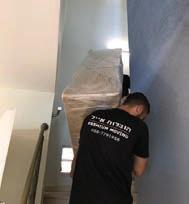

Invite you to three separate events
Sunday Night April 16 at 8:00 PM at Pelech Girls School (Yehuda 31, Baka)
Premiere of the new Destiny film
ABARBANEL: A MAN OF MANY WORLDS
Sunday Night April 23 at 8:00 PM
See the film “ABARBANEL” in your home on Zoom in case you cannot get to the physical premiere April 16

A DESTINY SHAVUOT RETREAT AT THE LAVI HOTEL


5 days, 4 nights May 24-28
with RABBI WEIN & other Rabbis. (HashgachaMehadrinRabbanutGalilTachton) For information and to register, send your email address to nachum@jewishdestiny.com
OU ISRAEL CENTER 77
Premiummoving.co.il 053-7272-815 PREMIUM MOVING & STORAGE ד"סב
Let us bravely confront the challenges that lie before us, not as fearsome obstacles, but as opportunities to strengthen our yirat shamayim, awe of the Heavens, and deepen our relationship with God.
TORAH 4 TEENS
BY TEENS NCSY ISRAEL


Shimmy Goldsmith
Raanana Chapter Director
Holy Today, Holy Tomorrow
Shalom everybody! In this week’s parsha, as b’nei Yisrael are about to receive the Torah, we hear about the preparations that Hashem tells Moshe to convey to Bnei Yisrael.
Sometimes we may experience an inspirational event such as a moving dvar torah or a special NCSY event, but to really be impacted we must remember it, and continue being holy today and in the future!
Aharon Rosensweig 12th Grade, Raanana The Motivation of Shabbat


Hashem tells Beni Yisrael that they need to become holy hayom umachar, today and tomorrow. This sanctification that Bnei Yisrael had to undergo to receive the Torah is understandable, but why do they need to do it today and tomorrow? Just once today would be enough and they will stay holy tomorrow! There is no need for both!
The Pardes Yosef says based on a Rashi in parashat bo:
Rashi tells us that the word machar does not always mean tomorrow, sometimes it can mean in the future. That is what Hashem is telling Bnei Yisrael. In order to receive the Torah now, you must become holy. However if you fully want to receive the Torah you must commit to being holy machar – in the future! Even after you leave har sinai!
This message applies to us also.
In this week’s Parsha, we were given the Ten Commandments as a set of rules we must live by. One of those rules is keeping Shabbat:
In other words, you’re supposed to do all of your work throughout the week and then rest on Shabbat. But how is it possible to accomplish everything you have to do across six days?
The המימת הרות proposes an interesting solution: when Hashem tells us to do all of our work throughout these six days, he isn’t talking literally. What he’s really saying is that during the week, we should try to accomplish as much as possible, and then use Shabbat as a day of reflection. When you have the chance to clear your head and look back on the past few days, there’s a good chance you’ll impress even yourself with how much you managed to achieve over such a short time.
78 TORAH TIDBITS 1504 / YITRO 5783
יעיבשה םויו ךתכאלמ לכ תישעו דבעת םימי תשש“ ”הכאלמ לכ ושעת אל 'הל תבש
רָחָמּו םֹו ּיַה ם ָּתְׁשַּדִקְו ם ָעָה־לֶא ְך ֵל הֶׁשמ־לֶא ה-ְי רֶמאֹּיַו םָֽתֹלְמִׂש ּוסְּבִכְו
”ןמז רחאל אוהש רחמ שיו וישכע אוהש רחמ שי“
It allows us to see Shabbat not just as a day to break free from the stresses of dayto-day life and enjoy ourselves, but also as a means of motivation. Shabbat can help us realize how much power and ability to do good each and every one of us has, and encourages us to use it to come back even stronger and more confident the next week, and that’s something truly special.
המלש האופר
• Miriam Tovah Chaya bat
Chanah Elisheva Rivka
•Yosef Ezriel ben Chaya Michal
Be’er Tziporah a"h - Bottled Water Gemach
Walking down King George St. in Jerusalem and want a cold bottle of water?
Come help yourself to a bottle at 52 King George.
In loving memory of Yoni’s wife
Tziporah a"h, a true Eishes Chayil, always full of chessed, kindness and laughter, and brought life and strength to so many people, that she touched! She was like Aron, who loved peace and pursued peace.

• Esther Fruma bat Baila
• Yisrael Leib ben Chana
Special properties for sale!

>> Off market! Rechavia penthouse!
Luxury finishes, big sukka balcony, elevator parking and storage, 12.5m NIS
>> Nachlat Achim amazing investment!
Selection of new apartments. 4-room apartment starting at 3.3m NIS

>> Talbia new exclusive!
New building 2 apartments left! Has parking, balcony and very high finishes. Price 60000 nis/sqm
>> Rechavia/ Shaarei Chessed! Duplex roof top apartment! Bright 4 room duplex with massive roof top and parking! 4.8 m nis
>> Unique renovated 4 room apartment on the first floor, balconies (one sukka) and storage! 6.5 m. Nis flex
Shifra Lopian 0526735300
Yoni thanks Hashem for having the opportunity of having Tziporah in his life, to learn of her caring, patience and happiness, to overcome her challenges. May Tziporah's Neshama be a light onto the world, in a time of darkness, and may her Neshama shine to Gan Eden. Yoni misses Tziporah with tears in his eyes, as Hashem gave him a gift, a crown jewel, now he returns her to Hashem. With thanks and Toda. Love, Yoni
To help refill the supplysend tax deductible donations for Be’er Tziporah a"h Bottled Water Gemach to Chabad of RechaviaRabbi Yisroel Goldberg email
Rabbi@JerusalemChabad.org 02 800-1717
www.JerusalermChabad.org/DonateShekels
'הל ודוה
OU ISRAEL CENTER 79
...
הלחמ ןב
רתסא ןב
לזייר הניס ןב ץרה ילתפנ • הכרב הנח ןב השנמ םהרבא
ןתנוהי •
המלש •
•
יכ
בוט
Torah as Poetry Dr. Avivah Zornberg
New Parashat Hashavuah Series
February 14th > Mishpatim
Law and Violence
February 28th > Tetzaveh

Megillat Esther
February 21st > Terumah
Golden Calf, Golden Cherubs
March 14th > Vayakhel-Pekudei
Beyond Images
Tuesdays I 6pm (11am EST) I In-Person at Beit Avi Chai and on Zoom
Admission: 20 NIS I Tickets: www.bac.org.il
44 King George St. I Jerusalem I Free Parking






















 Rabbi Avi Berman Executive Director,
Rabbi Avi Berman Executive Director,


 aberman@ouisrael.org
aberman@ouisrael.org

















 BY RABBI DR. TZVI HERSH WEINREB OU Executive Vice President, Emeritus
BY RABBI DR. TZVI HERSH WEINREB OU Executive Vice President, Emeritus
















































































































































































































 BY JACOB SOLOMON Contributer, Torah Tidbits
BY JACOB SOLOMON Contributer, Torah Tidbits






















